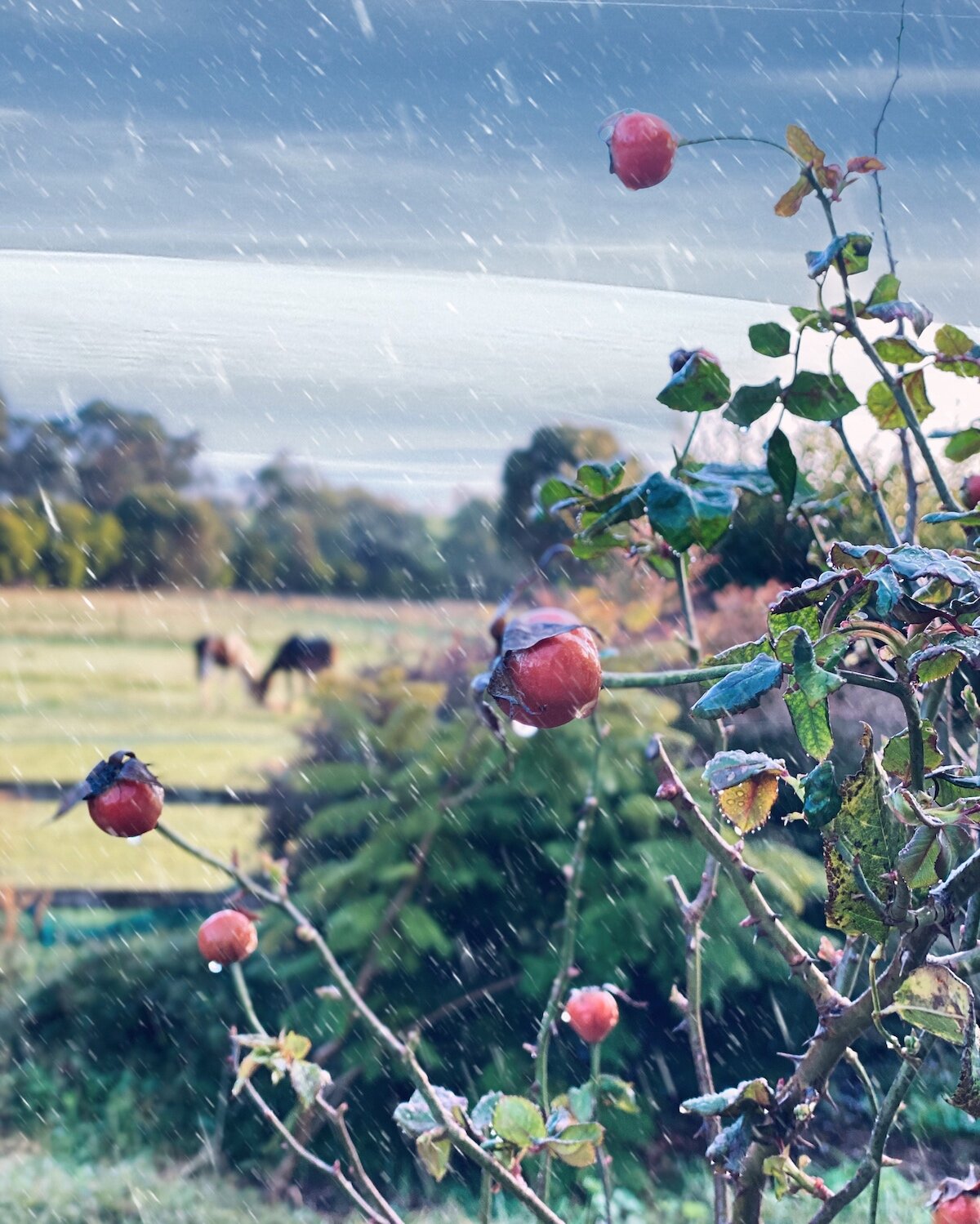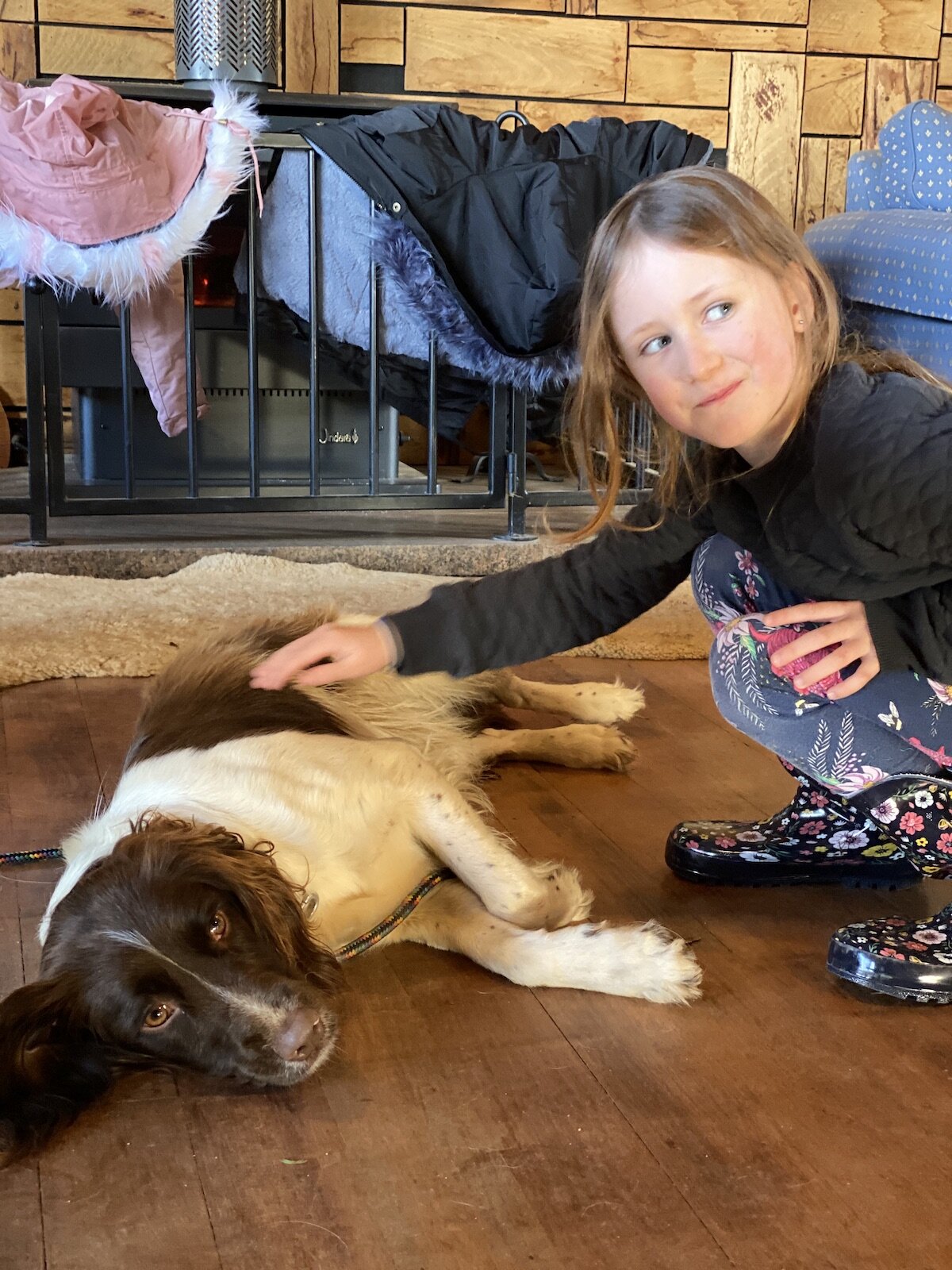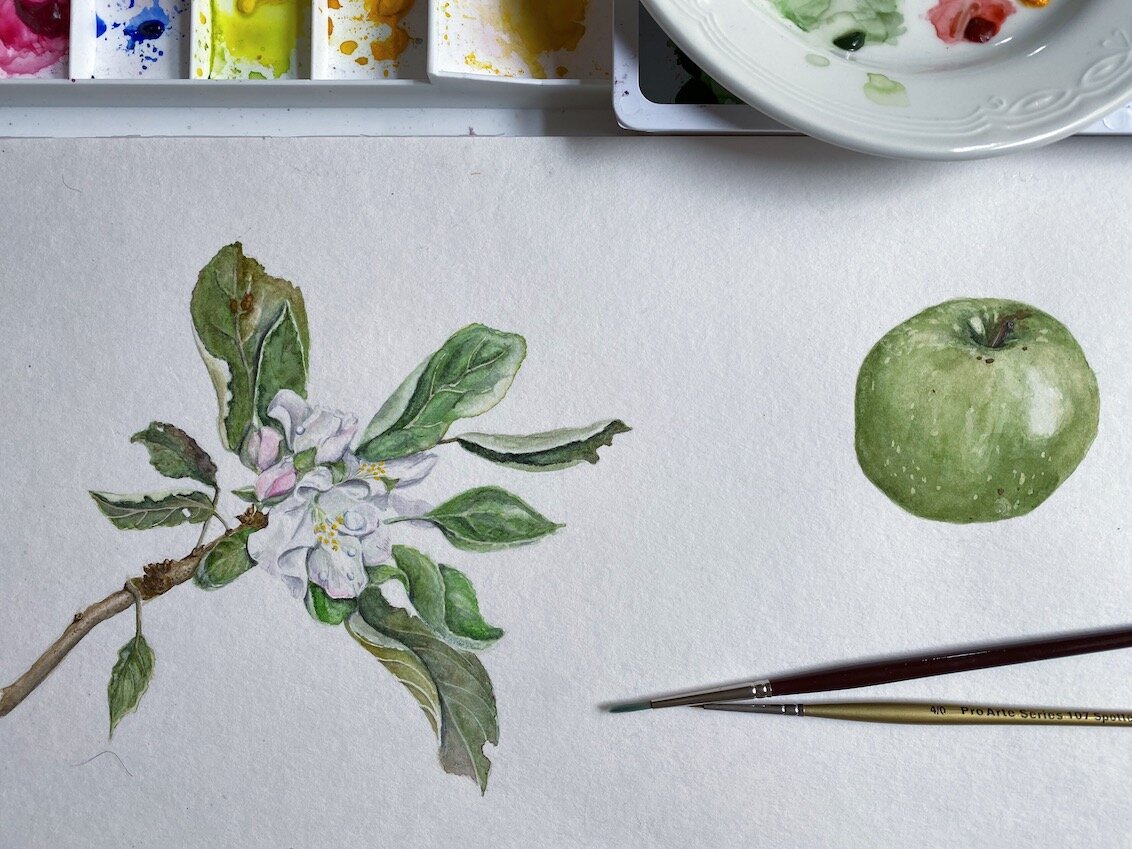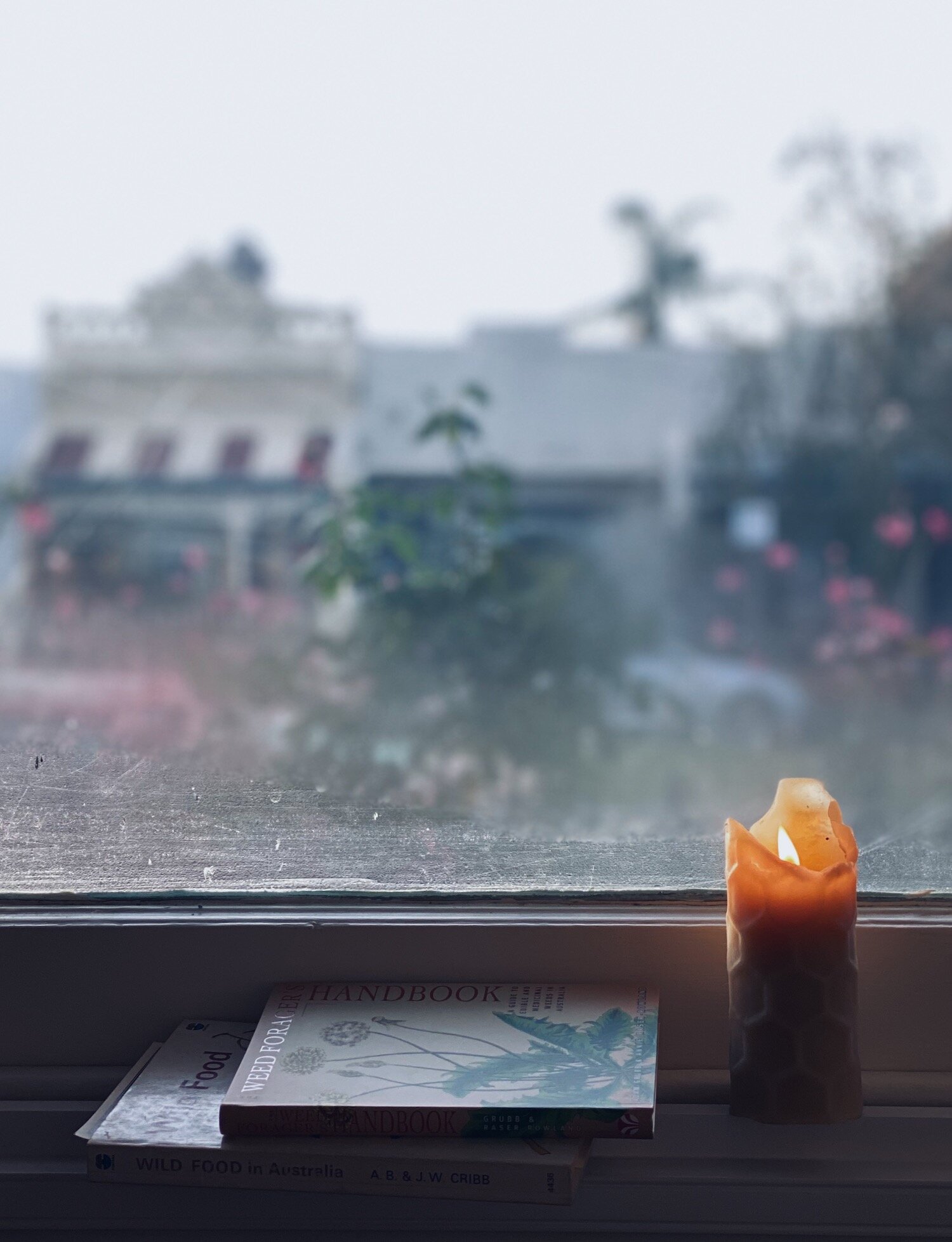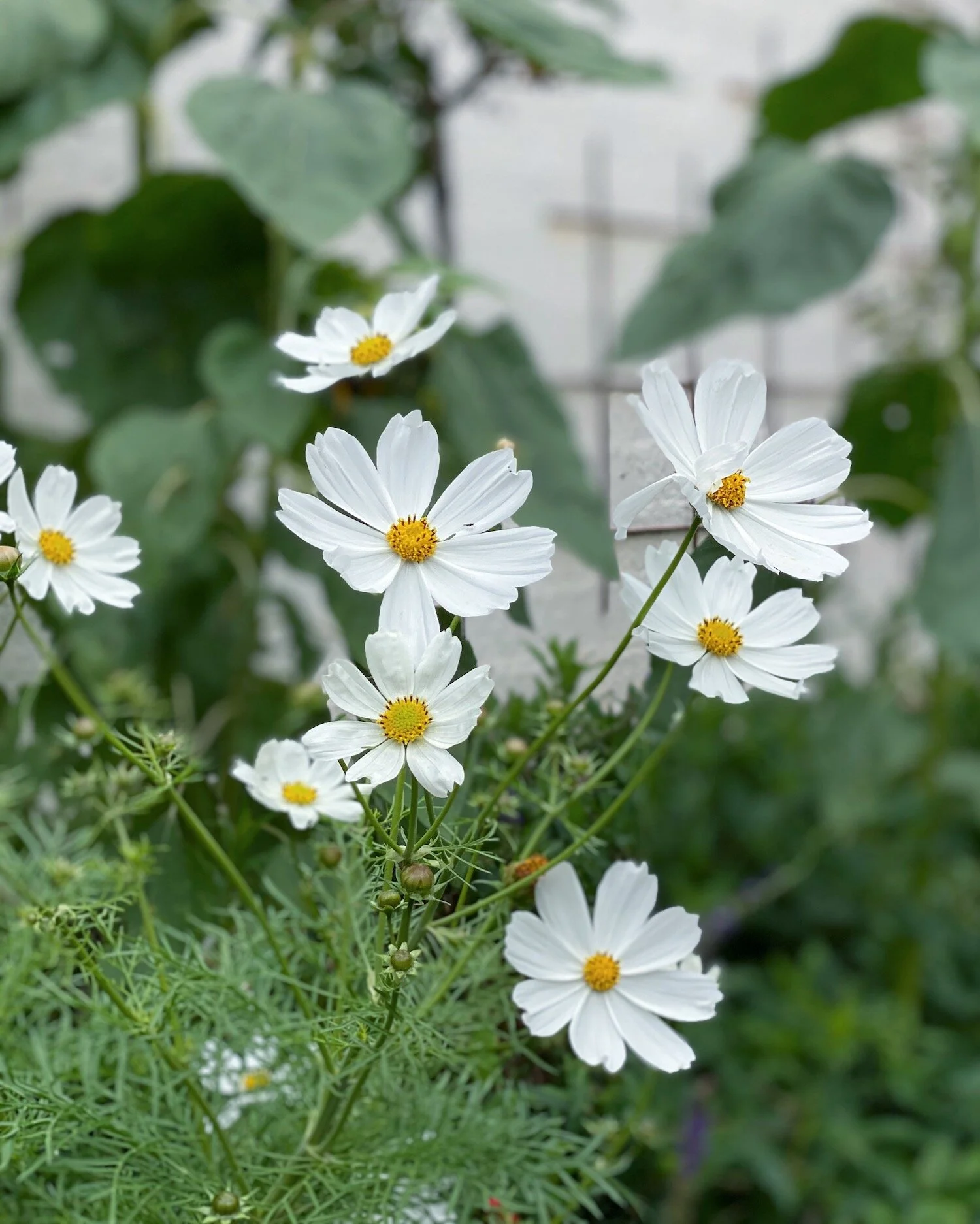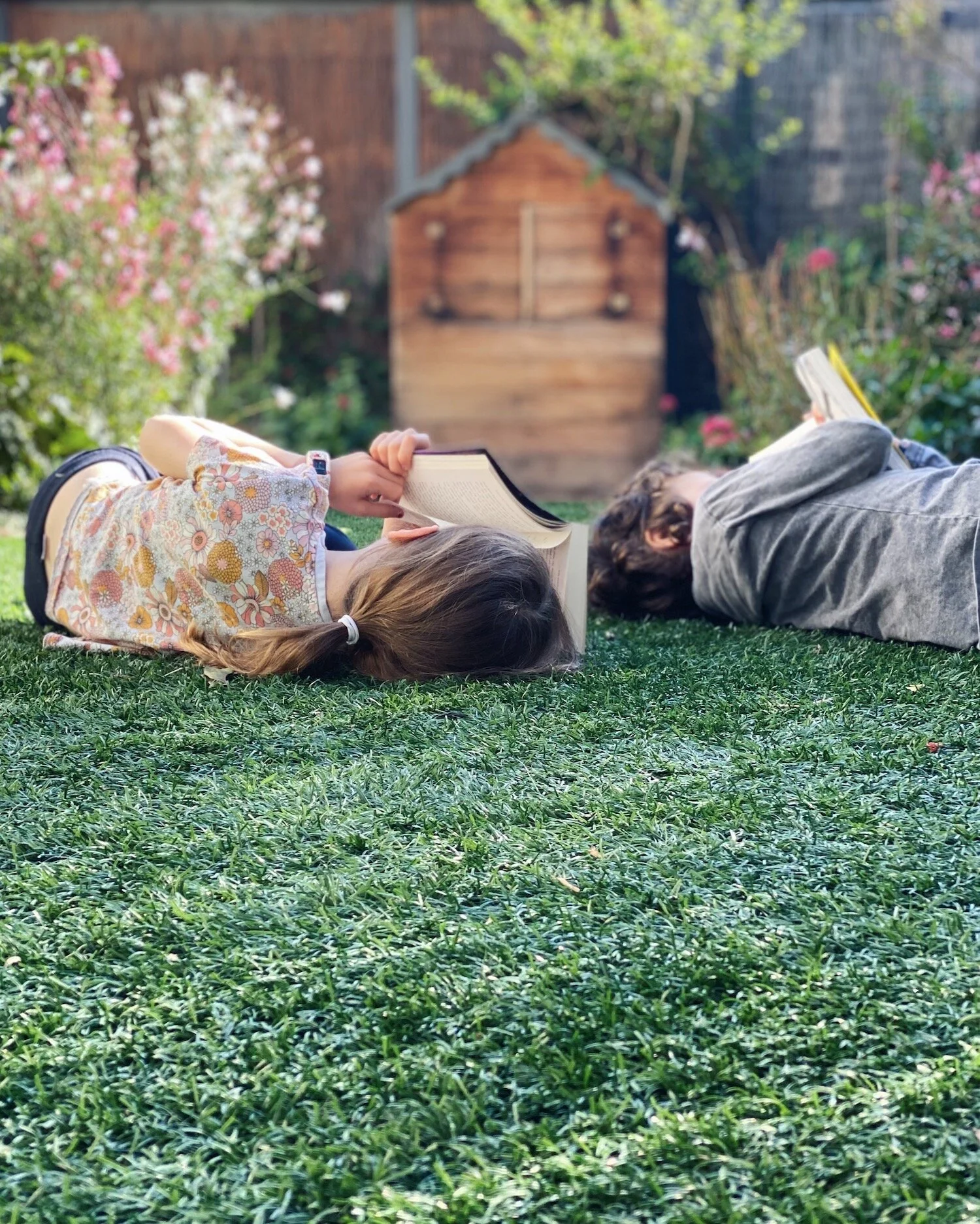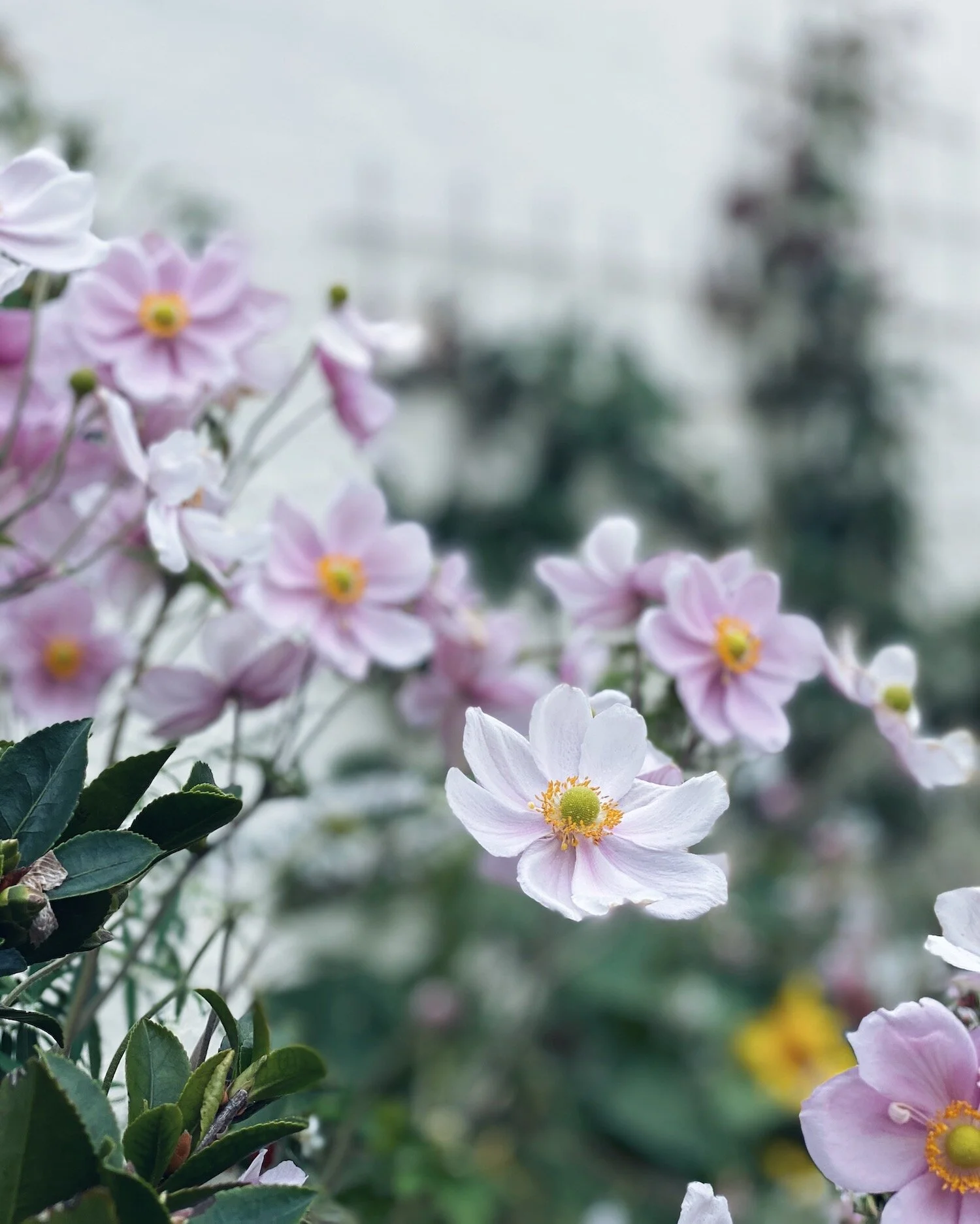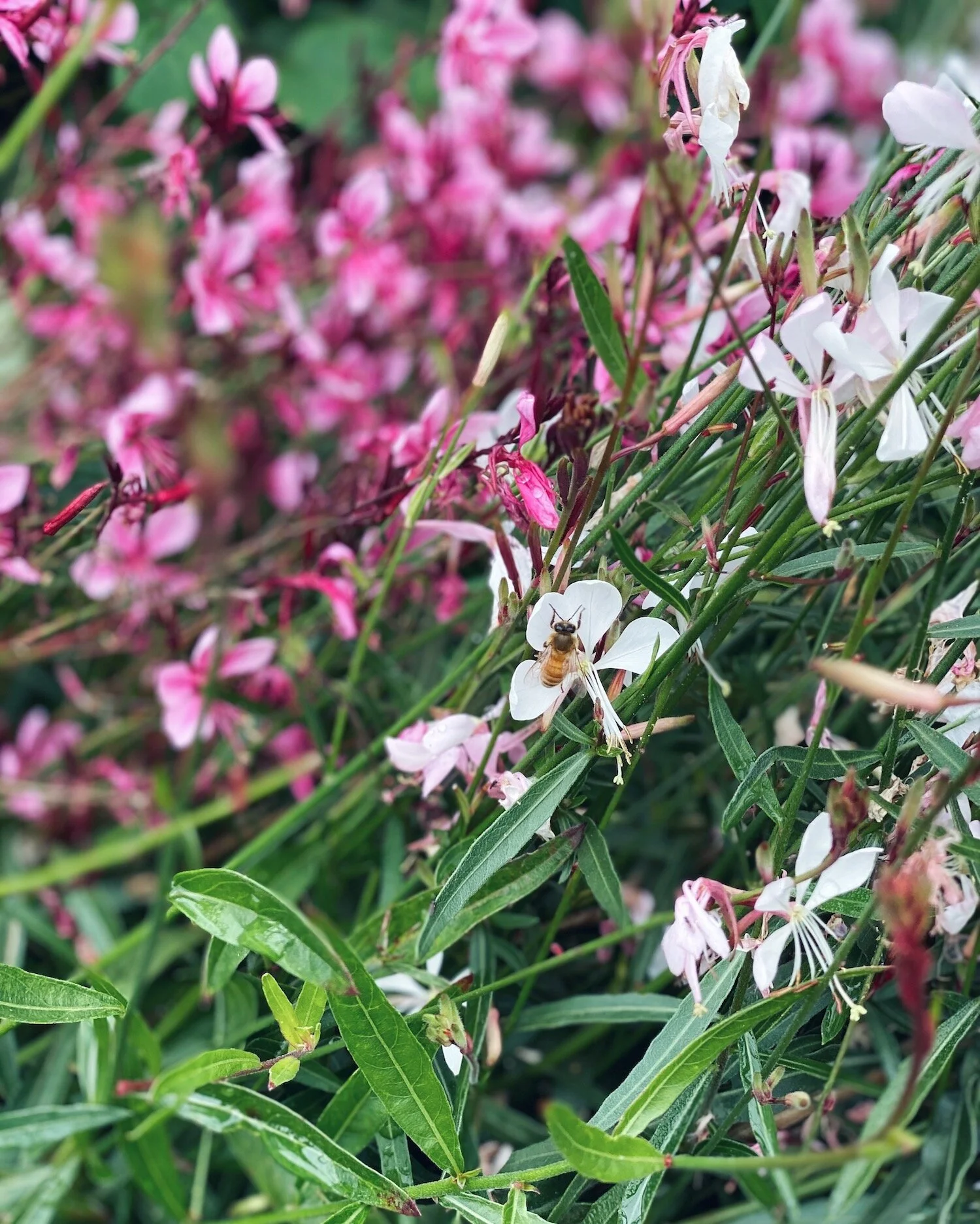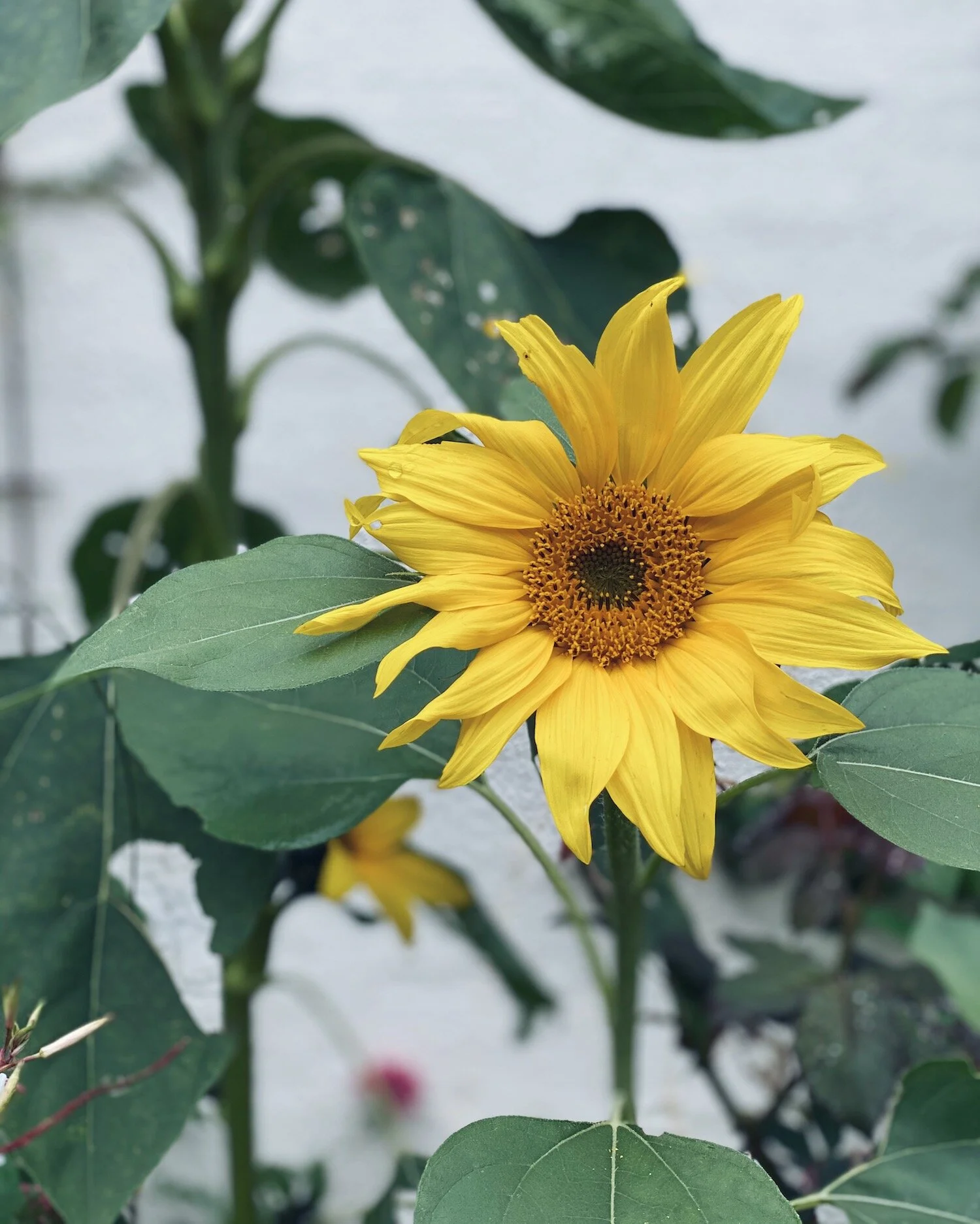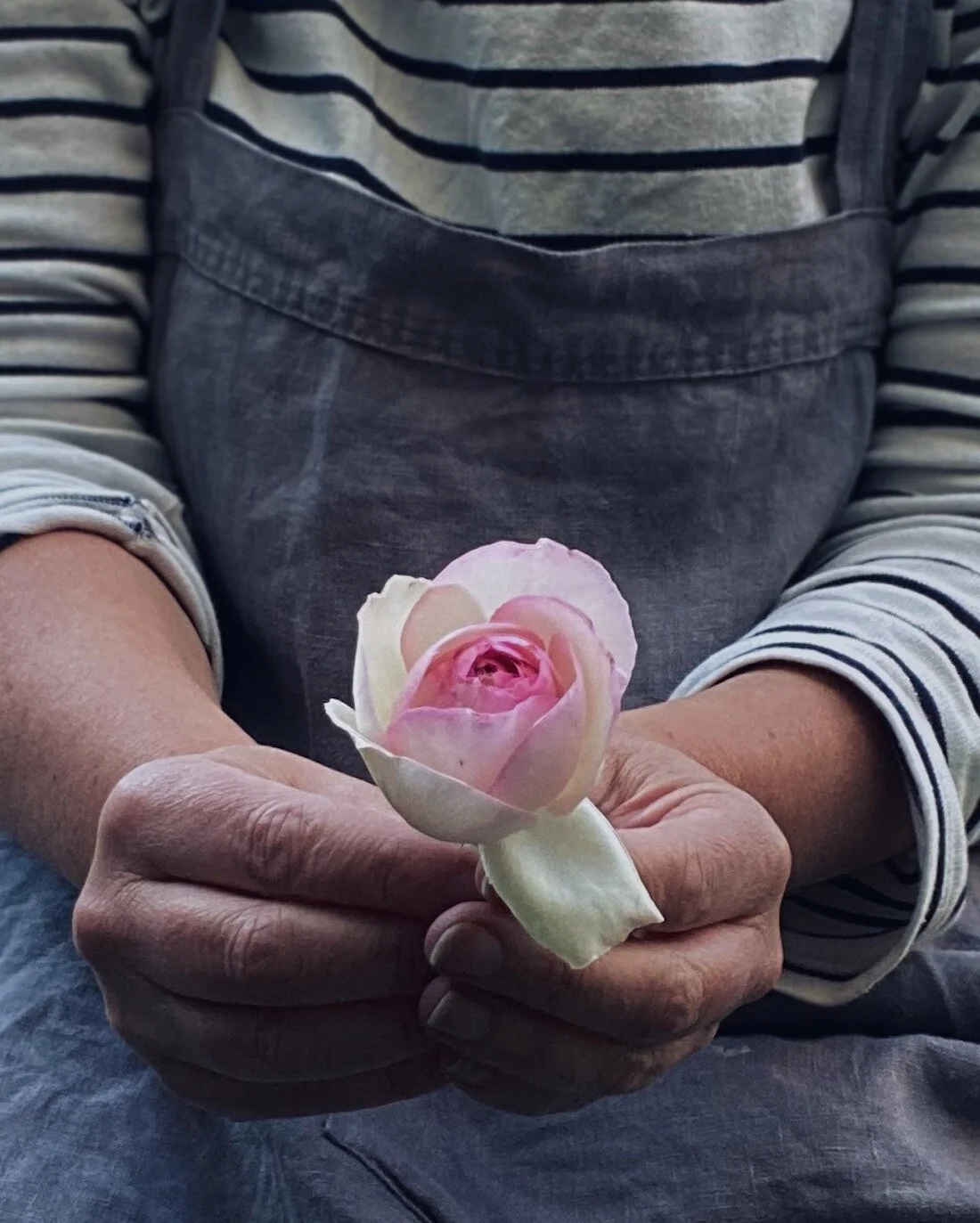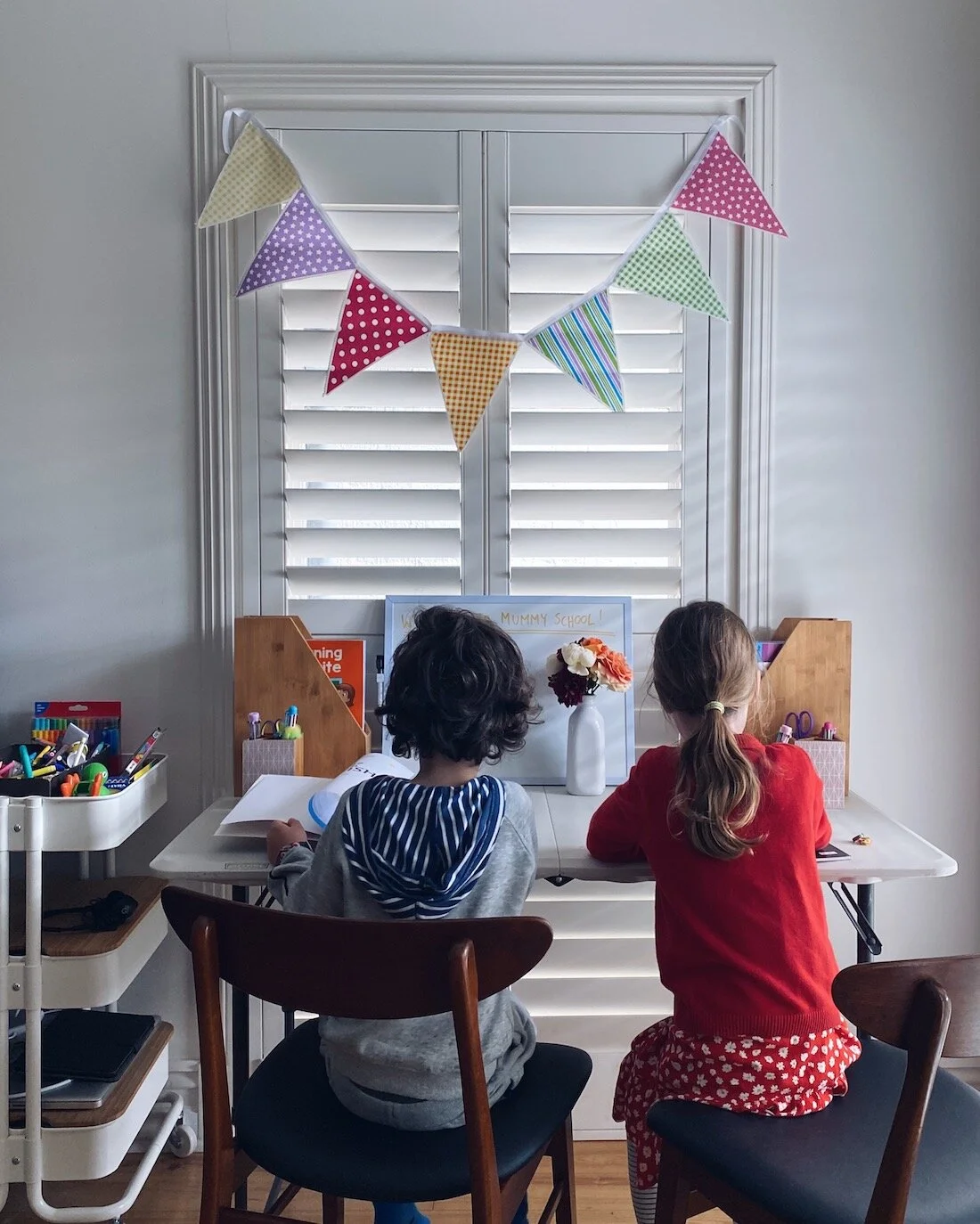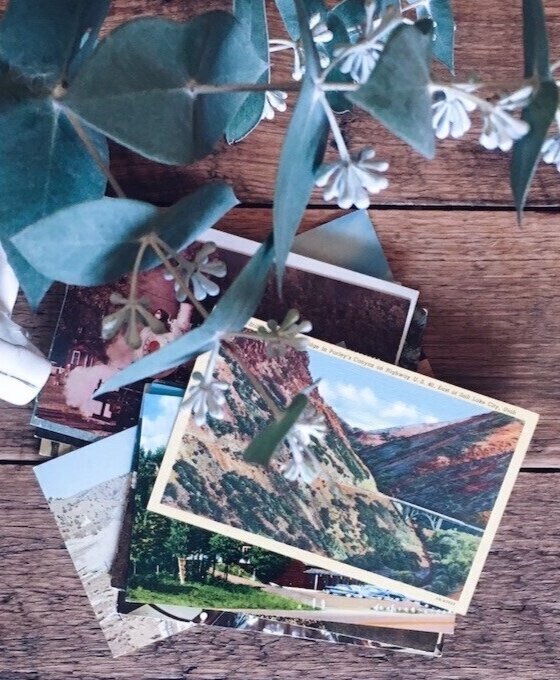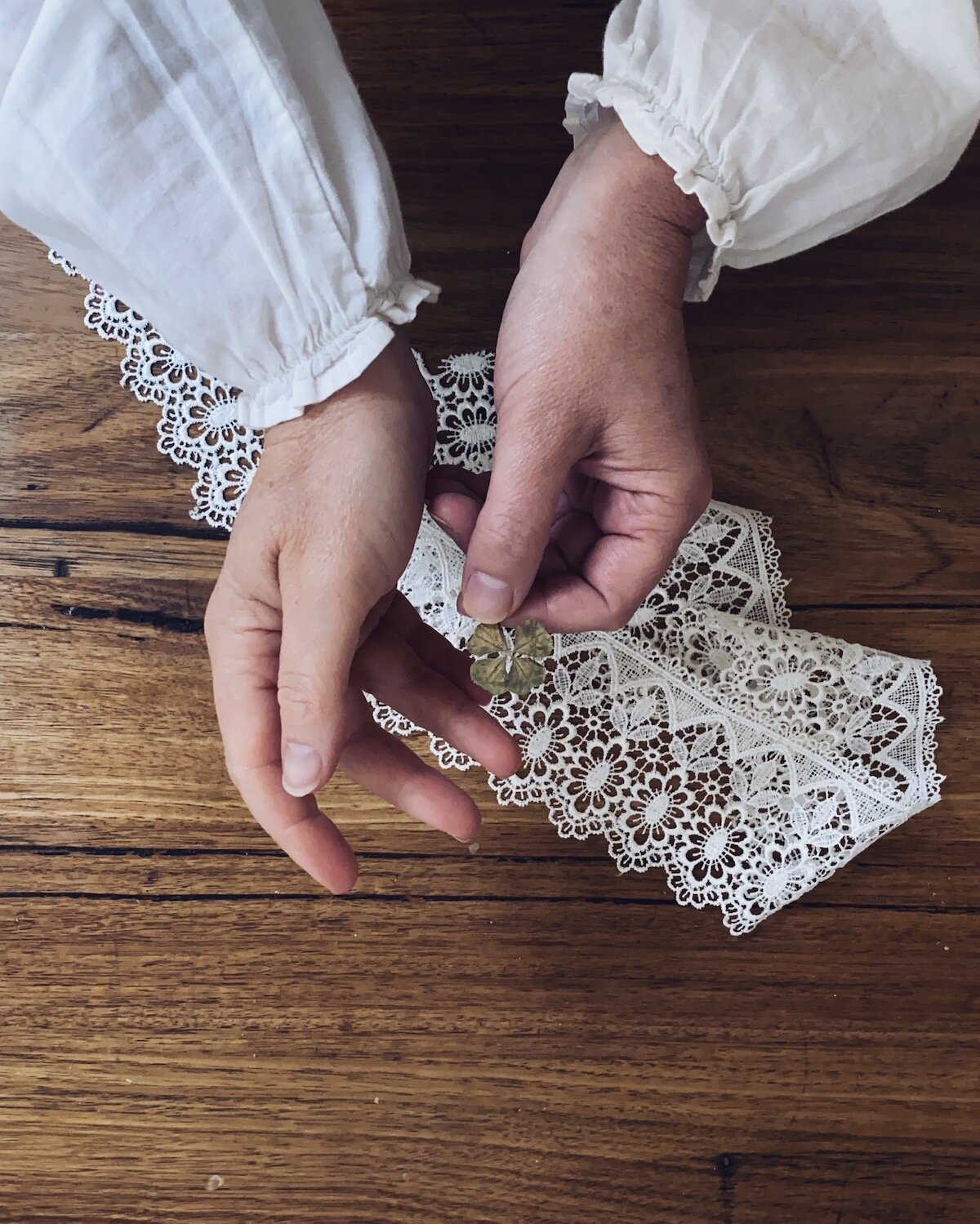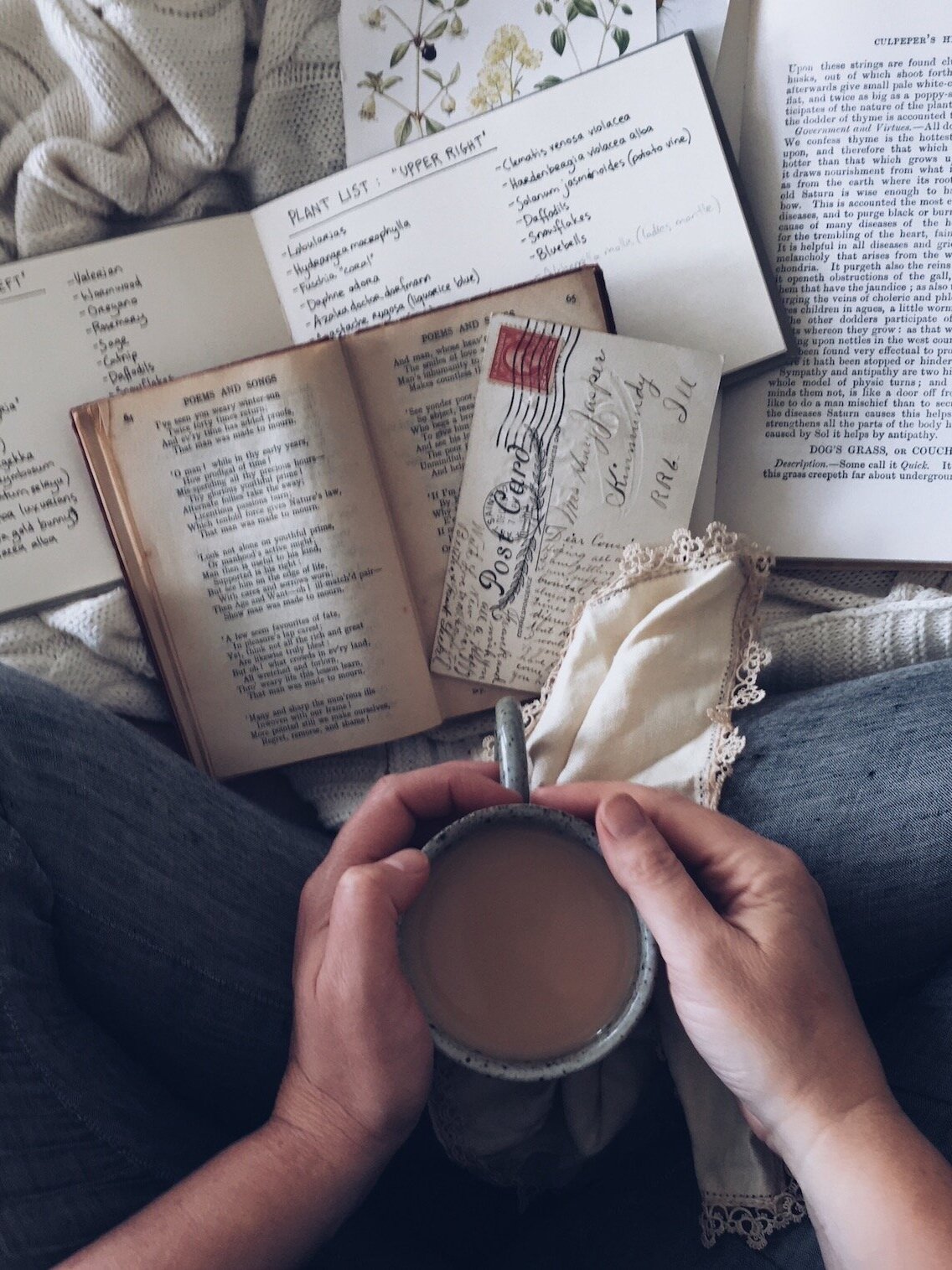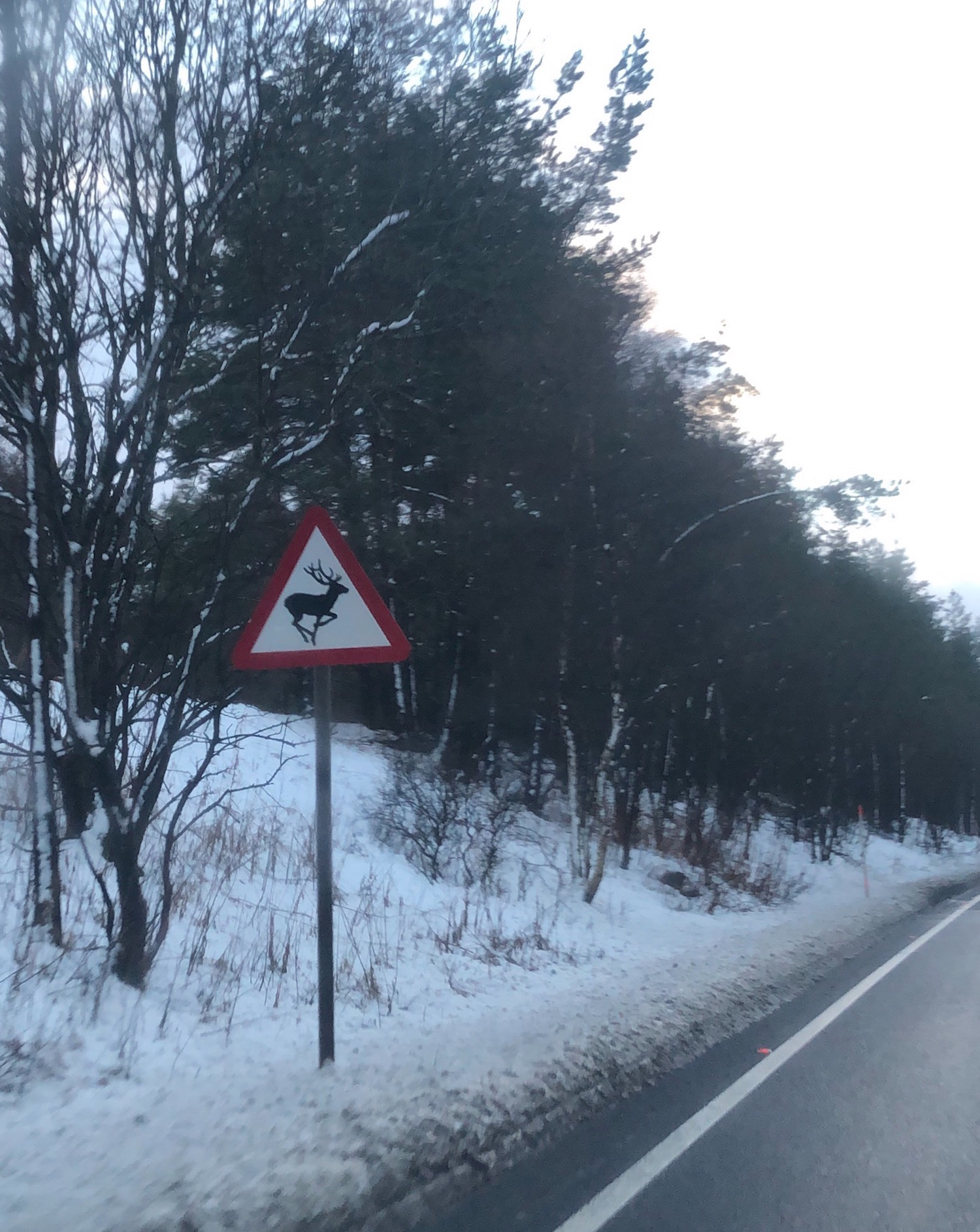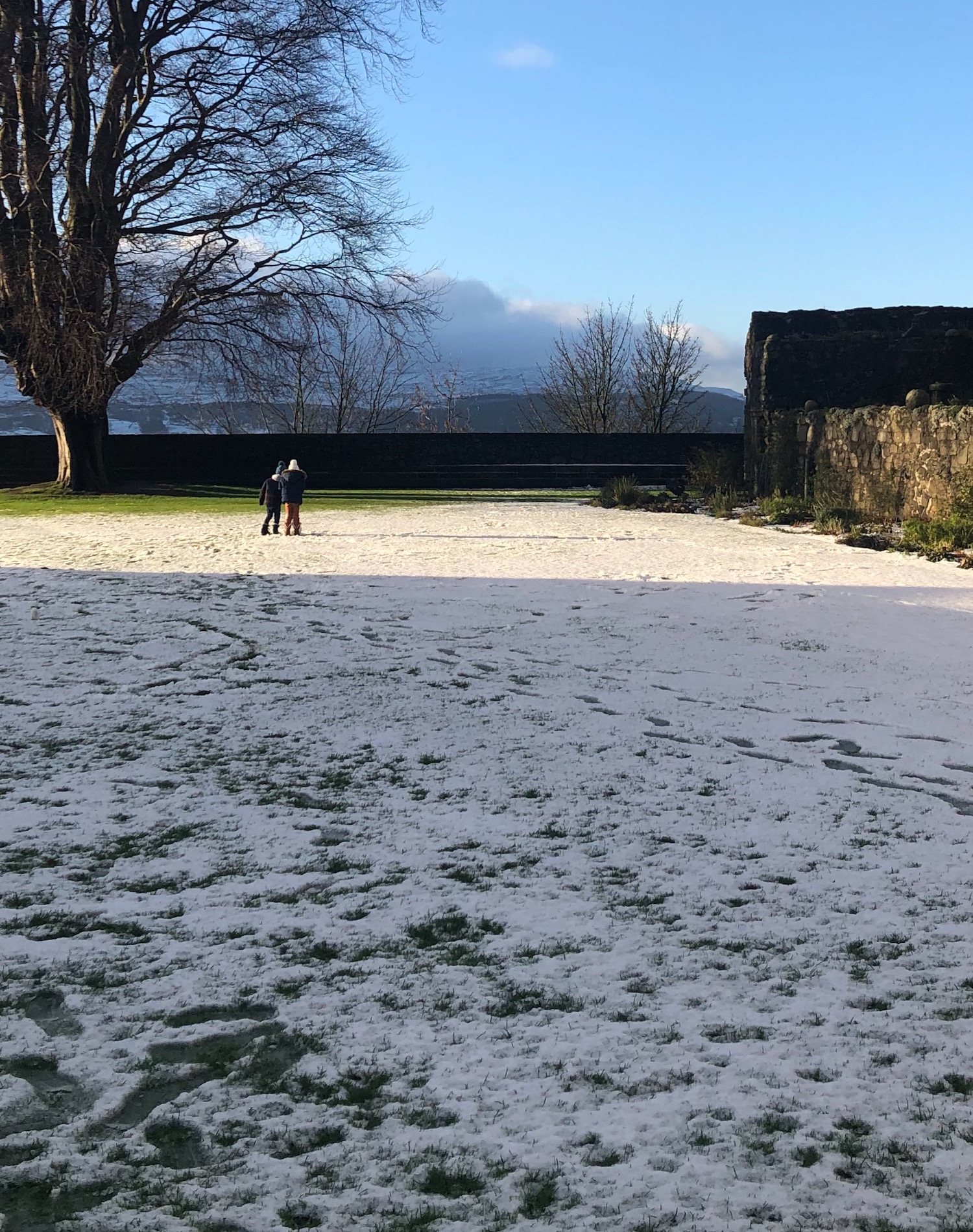
JOURNAL
documenting
&
discovering joyful things
Hunting for gold under rainbows
The first rainbow appeared in the morning, stretching in a big, lazy arc across the farmhouse, dissecting the clouds in luminous colour. It looked like one of those stretchy rainbow-belts we used to cinch around fuzzy, mohair jumper-dresses in the 1980s. The rainbow felt like a portent, a promise of good things to come on our little weekend away, our first foray out of town since everyone started hoarding toilet paper back in March.
In reality, the rainbow turned out to be a promise of rain: first a sun-shower, which blew Ralph's mind ("the rain is GOLD!"), but then the sky closed over and down it all came. We gave up exploring on foot and made a dash for the car.
There was a farm gate sign saying "Pine cones $2" and if you live in the country you will probably think that is CRAZY and why wouldn't people just go to the fun of collecting their own pine cones? But we live in the city and the last time we found our own pine cones the children were this little. And every year I say "We will find somewhere with old pine trees to collect some," but we never do. So we thought $2 was a pretty good bargain and pulled over to buy a bag to decorate them at Christmas, but there were no bags of pine cones left. Only worm juice.
The next day at the General Store they were selling bags of pine cones for $12, so I guess we know who bought all the ones at the farm gate.
The truffière building was at the top of the hill, all wooden walls and wooden floors and wooden tables and chairs, with a wooden kitchenette where they washed and stored the truffles, and a roaring wood fire by which two springer spaniels were sleeping.
We crowded in gratefully, hands outstretched to the fire, as the dogs danced around us and the farmer handed around a big bowl of truffles from her morning's find. Ralph whispered to me, "I don't like the smell of wet dog," and I couldn't tell whether he was actually smelling the dogs or the truffles.
(Something I learned: did you know you can put a truffle into a lidded container with your eggs overnight, and when you make scrambled eggs in the morning they will be truffle flavoured?)
I've heard truffles called "diamonds of the kitchen" and, as we stepped out among the oak trees, the winter sun was making a riot of the raindrops on the leaves and the entire farm was lit up like a million diamonds. Or a disco ball, if you're on a budget.
Thomas the springer spaniel led us through rows of oak and hazelnut trees. I asked the farmer, "Do the hazelnuts mean you get a double crop, or else a tasty consolation prize if you don't find any truffles?" She told me yes, in theory, except that the white cockatoos had eaten ALL the hazelnuts. All five acres of them. So there went my brilliant idea for homemade truffle Nutella.
I don't know what I expected a truffle hunting dog to do: maybe race from tree to tree, sniffing and barking like a police dog in a detective show? Instead, Thomas ambled happily among the trees, apparently enjoying the stroll, until the farmer told him, "Find a truffle, Thomas!" and he began to sniff around with purpose.
When he found one, he was simply supposed to lie down. But he didn't want to, because the ground was wet. He wiggled and fidgeted from side to side, easing himself part way down and then leaping back up and looking for a treat. I couldn't blame him, I didn't want to lie down in that mud either.
The next rainbow appeared over the oak and hazelnut trees, a brilliant arc reaching out of the sky and landing clearly in an open field to the left. We all paused in our dig for black gold to wonder whether there could be pot of real gold in that paddock. It reminded me of the time, when I was a teenager, that my brother's friend and I spotted the end of a rainbow at the bottom of our horse paddock. I raced down because I wanted to know what it felt like to stand inside the rainbow but when I got there, I couldn't see anything. Not until I looked up and there was the rainbow again, floating in a tantalising way above me. I leaped up and down, stretching to try and touch it, but to no avail. My brother's friend though, still watching from the top of the hill, said it looked as though I was dancing inside a river of colour.
Our first truffle was rotten from all the wet. The farmer cut it up and dropped it into a shallow ditch dug alongside the trees, so that the spores would soak into the soil and re-inoculate the trees. But after that, Thomas found his stride, and both children were given a turn digging up their very own "black gold." I thought they might have found it boring but they were excited: it was like a treasure hunt! They both made polite and appreciative "Mmmm!" sounds when the farmer passed them their muddy treasure to sniff, although neither was keen on eating anything more adventurous than truffle butter on their warm bread at lunch later.
We might have kept going but at this point the rainbow fulfilled its promise again and as "light sprinkling" transformed gradually but all too quickly into "decent downpour," I remembered that I had left our umbrellas inside the timber-clad shed with the roaring fire and the second sleepy springer spaniel, so we all made our way back up the hill and out of the cold winter rain.
Later at lunch in a nearby winery, warm and dry, we watched the rain and sunshine come and go across the vineyards in dancing swathes of alternating grey and gold. The children approved of the truffle butter on their warm bread but truffle shavings over the potato soup was a bit too rich for their taste and both declared truffle ice cream to be "just wrong." That's when the third rainbow appeared, framing the vineyards like a bucolic oil painting.
Then the skies closed and the rain returned, gurgling through pipes and plonking and splashing off the wine barrels on the empty verandah outside. A frog started singing. Is there anything more cosy that watching winter rain fall outside, while you are inside where it is warm, with the people you love the most in the world, feasting together and sipping wine, with nowhere else to be for the entire afternoon?
Apples, autumn, and broken hearts
It was a poignant moment. We were out for our daily exercise, the children rolling their scooters through piles of leaves and whorling autumn winds, turning the footpath into a miniature circus maximus (a circus minimus?) for their two-wheeled chariots.
There was a letter for Scout in the post and seeing it reminded me that she had a birthday coming up. (Eight! How did that happen?) And that for once, I’d have to plan ahead, this time relying on the already slow post for any birthday shopping.
I stopped her mid-chariot race and asked her to think about what she might like for her birthday this year (“no promises, but you can always let me know”). “OK!” she agreed, then scooted off again with her brother, no doubt happily dreaming up a wish-list of plastic monstrosities and impractical clothes. I braced myself.
Several more blocks of walking and scooting passed, several more mountains of leaves, but surprisingly, the requests failed to come. “I just can’t think of anything,” she told me at last.
On we scooted, more races, still more leaves, until she circled back to me again. “Mum, I don’t know what I want for my birthday because the only thing I actually want, I can’t have.
“I just want my friends.”
And that right there is how hearts break.
But in happier news…
Lingering autumn sunshine at the start of this week enticed us back out into the garden, where I cut, trimmed and coaxed all that was end-of-summer and overblown back into order, ready for the winter sleep. I lifted out the dahlia tubers, cut back the salvia, pulled out the over-zealous wild violets, gently pruned the standard roses and ruthlessly pruned the climbing roses. Out came the elderberry suckers, finished sunflowers and dried-up cosmos. In went the sprouted celery-bottom, a winter tarragon, and a neat row of garlic cloves.
All of the above was completed in stages, in between me being escorted away in gentle but no-uncertain terms by the bees, all of whom appeared to be knee deep in a case of autumn-mania. They’d permit me to dig and cut for only so long, before one would start circling my face, buzzing and nudging until I hot-footed it back to the house. There I’d hesitate in the shade of the balcony, calling out futilely, “You’ll thank me in the spring!” before venturing, inch by inch, back to the garden bed. Ten minutes later, we’d start the whole parade all over again.
When the bees permitted, I discovered the first spikes of daffodils, bluebells or snowflakes - I’m not sure which, it could be any combination of the three - peeping up from among the fallen leaves, harbingers of future colour.
A day or two earlier, on the weekend, Scout and I had walked to CERES in what was frankly freezing rain. It was such a pleasant walk together despite the weather, holding hands and chatting about everything and nothing. Once there we picked up a new pair of gardening gloves for her (which she wore home to ward off the cold wind), and a dibber for me, which was the point of the excursion. And here is a great mystery: why is it that as I hurtle towards my fifth decade on this planet, I have only just now purchased a dibber for planting bulbs?
Every year, putting those bulbs down has been an arduous, time-consuming task, trying to dig holes with a spade, deep and narrow, while not disturbing the roots of any surrounding plants. But yesterday, I put down 20 white bluebells, 10 snowflakes, 5 spare tulips, 10 allium drumsticks, and 10 nerines (all unplanned, Edna Walling style, by gently tossing small handfuls in the air and planting them wherever they landed). It probably took me less than half an hour to plant the lot, with zero disruption of the roses or any other pernickety plants nearby. Thank you dibber, my new best friend.
I’ve been researching a big list of seasonal produce, and painting them as I go. The biggest insights so far have been just how little I know.
Take apples, for example. Apples are autumn fruit and we probably all know that. Even I knew that, so I didn’t think there would be lessons to learn about eating apples in season. But I was wrong! Because here in Australia, apples are available all year ‘round, in both the supermarkets and all the fruit and vegetable shops. Even at the fruit and veg markets. And I’ve never really thought about where they are coming from but, if you’d asked me, I’d probably have hazarded a guess that Australia has a (relatively) moderate client, and it’s big, so the apple season lasts longer and spreads across several months in several States.
As it turns out, no.
The apple season lasts a couple of months at most. And here’s something I should have known but didn’t: once the apples are picked, the ‘bloom’ (the natural wax on them) is blasted off, to be replaced by a new wax made up of either shellac - secretions made by lac beetles - or carnauba, which comes from Brazilian palm trees. Then the apples are put into cold storage for up to a year. That apple you buy in December has probably been sitting in the ‘fridge since April, and may or may not be coated in beetle secretions.
Anyhoo, we all get to choose how we shop and what we eat, and I’m not immune to the fact that there is an enormous amount of privilege in me making that statement. But my point is, no judgement! Eat the December apples, don’t eat the December apples. Wax on, wax off, Daniel-san. But isn’t it nice to make choices that are informed? In the future I’ll be keeping one eye on my research, and the other on the calendar to find out when the farmers’ markets reopen, redoubling my efforts to shop direct from the growers.
And in the meantime, the winds have picked up. The autumn leaves are falling. Let’s play!
Wins and losses and taking stock
The ebbs and flows of life in lockdown.
Win: this week Scout discovered the joys of Harry Potter. She is nose-deep in Harry Potter and the Philosopher’s Stone, and each morning when she comes downstairs after reading, we talk about what has been happening inside the pages. Sharing a book I love with her is like travelling together. We may not be able to leave the neighbourhood but together, we travel to Number 4 Privet Drive, to Diagon Alley, and to Hogwarts, every morning.
Loss: school at home. Don’t even get me started! I don’t think I’ve ever felt the kind of anxiety I experienced during that first week of school. The teachers are doing the most amazing job creating learning content for the children, and I’m incredibly grateful. Let’s just say there is a disconnect between the school’s expectations and communications, versus our access to technology, devices, my time, and the children’s capacity to independently follow instructions and use technology they have never seen before.
Win: last Thursday we ditched school for most of the day (with permission) and spent several hours baking hot cross buns via Zoom with private cook Gillian Bell, otherwise known as @gillianbellcake on Instagram, and one half of the delightful Dispatch to a Friend podcast. Gillian gave up a good part of her day to bake with us, and I can’t decide whether the best part was the proud smile on Scout’s face when we pulled those wonky-but-perfectly-cooked buns out of the oven, or the joy of spending time with Gillian and chatting with her about everything from yeast-bubbles to mental health and post-war life in London. I’d like to do this again soon, please.
Loss: scared and angry people in the street looking at my children as though they are predatory germ-terrorists every time we have to leave the house to get food or exercise. We follow the rules. We stay out of the way. They huddle in sad corners outside the grocery store following my instructions to stay out of the way, not move or touch anything, while I race in and buy the basic staples I can’t get online. They dive into bushes to escape cyclists who race past without slowing or swerving on the shared foot-and-bike path. And they endure angry looks, snide comments, and, occasionally, openly hostile “Get out of the way!” shouts from older adults if we happen to be on the footpath while someone wants to walk towards us.
Win: I got all the bulbs that our friends Pam and Kaylene gave me into our garden, I’ve trimmed back the gaura that was going wild at the front of our house, the roses are having a bumper autumn, and whenever the weather is warm we take ourselves out into our tiny garden for fresh air, snatches of sky, and growing things. Never have I been more grateful that I turned our tiny car-park into a garden than I am now, during these funny, self-isolated days.
Loss: the possums are loving my garden too. I mean really loving it. They particularly love the roses, the pomegranate tree, and one of the apple trees. I’ve tried sonic deterrent. I’ve tried possum spray. I’ve tried netting. I don’t know what else to do!
Win: last weekend I hosted my Signature Scent branding workshop online, an adaptation of the workshop I’d hoped to host in my home. I was very nervous about how it would all work out, but could not possibly have dreamed up a better group of women to join me for this. They were - one and all - intelligent, creative, fun, kind, enthusiastic, and enormously patient with me and the technology. I entered it full of nerves and came out on an absolute high, almost entirely because they were just such good company!
Loss: angry emails. I guess everyone is feeling anxious and stressed. A customer of one of my clients got the wrong end of the stick and in his anger, he lashed out at both my client and me. It was one of those situations where you can tell yourself it isn’t personal, you can tell yourself that these people have their own problems and their own issues going on in their own lives… but it still hurts. It can still cause sleepless nights here and there, and reignite insecurities old and new. Let’s not forget our compassion in all this mess, nor that the person on the other end of a complaints form is a real person too.
Win: knee-deep drifts of autumn leaves and alllllll the joyful games.
Loss: it plays on you doesn’t it, the isolation. Loneliness; feelings of claustrophobia; angry neighbours and online meanies; constant, low-level anxiety. Turns out resilience isn’t in never-ending supply without careful nurture, and I find my own capacity to cope ebbs and flows each day (and several times within a given day). Are you experiencing the same?
Win: we are healthy, and so are our loved-ones. I don’t underestimate how truly lucky we are.
Win (sort of): every year of his childhood, my husband’s family sat a stuffed Santa under the tree among the presents. It is a cherished memory of his and so, even though Santa’s stuffing was literally bursting out of his belly-seams, half his plastic face had caved in, and one boot was mysteriously missing, my husband held onto the doll. It was packed away in a box marked “nostalgia” that has moved with us from house to house and State to State for more than a decade. Over Easter Mr B cleaned out our shed (there was little else to do!) and in doing so, rediscovered Santa. He found a lady online who could restore the doll and this weekend, Santa was returned to us, almost as good as new. My husband is THRILLED. All day on Sunday (oh yes, the post came on Sunday!) he kept saying, “I’m so happy Santa is back. Kids, look at Santa!” (Although he did find Santa’s newly-smooth cheeks disorienting, and poked his finger into one side to restore the dent he remembered so well from those childhood years).
The reason this is only a “sort-of” win rather than an unambiguous win is because, frankly, Santa is TERRIFYING. He has blood-red wrinkles, a demonic grin on his face, and his eyes follow you around the room. It’s like having a Chucky doll leering at you from the mantlepiece.
Taking stock
Pip Lincolne of Meet Me at Mikes has been doing “taking stock” posts for years, and I thought I’d join in today with a version of my own. Do you want to do the same? Just copy and paste my list below, and replace my answers with your own. Be sure to let me know so I can come and see what you’ve been up to.
Making: beautiful brand style-guide brochures in InDesign for my workshop participants
Cooking: today I made a Sunday roast chicken using the recipe from Yotam Ottolengi’s book SIMPLE and it was seriously good! So far everything I’ve made from this wonderful cookbook has been a win
Sipping: tea, always tea. English Breakfast, rosehip, peppermint - these are my favourites
Reading: The Lost Future of Pepperharrow by Natascha Pulley. Also, the wonderful #dispatchfromisolation story submissions, following this post. Thank you to everyone who has taken the time to write to me! Please feel free to share your own story if you haven’t already
Listening: to the Amelie soundtrack. It makes me feel calm, creative and happy
Wishing: the same thing as just about everyone else on the planet is wishing! You don’t need me to tell you what that is
Enjoying: these cooler nights, and the sound of rain on the bedroom roof
Eating: too much! You may need to fork-lift me out of the house once self-isolation finally ends
Liking: rainbows and teddy-bears in windows
Loving: my beautiful children, who remain so loving and forgiving despite my moods
Buying: a big box of fruit and veg at least once a week, thanks to our lovely local greengrocer Senserrick, who take our orders via text and deliver on the same day
Watching: we’ve been re-watching The Durrells. The whole family is so beautifully flawed but redeemingly lovable, and their idyllic life in Corfu is a wonderful antidote to all that’s going on
Wearing: nothing exciting worth reporting!
Following: @hessaalajmani, who presses botanicals into ceramics
Noticing: stuffed Santa is staring at me right now and it’s FREAKING ME OUT
Sorting: I mean, how many pairs of socks to two small children actually need?
Getting: restless
Coveting: escape
Feeling: ask me in five minutes and it will probably have changed
Our small but significant stories
Recently I participated in a giveaway, organised by Annabelle Hickson on Instagram. I’ll share more about that at the end of this post as there are some beautiful prizes you can win. But what prompted this blog post is that Annabelle asked me to share a piece of my story from “lockdown” for the giveaway and, as I was writing to Annabelle, I couldn’t stop thinking about you.
About all of us, really, all over the world. About how this whole COVID-19 experience is so extraordinarily… universal. Never before in history have we been so physically isolated from one another and yet, at the same time, never before have we been so united against a common enemy.
When generations in the future look back on this period in our lives, what will they say? The history books will talk about the big things: the spread of the virus, the deaths, the heroes, the privations, the cure or vaccine (assuming one is found!), the economic fallout… but what will they say about you and me? About what our lives looked like, at home, small but oh so significant, during this unprecedented time?
So I’ve been thinking that I would like to start collecting the smaller stories. OUR stories, little dispatches from isolation. Isolation and lockdown are powerful silencers: there are no external witnesses to my days and nor, I imagine, are there any to yours. Let’s change that!
If you would like to share your story of COVID and lockdown, I will include it in some kind of publication: a specialised blog, an online magazine, an e-book… I don’t know exactly how yet, because that will be governed by the quantity and style of stories I receive. But I can guarantee that if you tell your heartfelt story, you will be published. I can share your name, or keep you anonymous if you prefer.
SUBMIT YOUR STORY
Tell me about your experience of lockdown and social-isolation. Write a sentence or write an essay - it’s up to you! I don’t want to restrict you so you can write anything you like but, if you find yourself stuck for words, here are some prompts or interview questions (inspired by Annabelle’s questions to me) to help you:
Where do you live (just give your city and country)?
The date you’re writing (because things are changing so rapidly!)
What is your name (just say “anonymous” if you’d like to remain so)?
Where are you bunkering down for this period?
What do your days look like?
How has this pandemic impacted you and those you love?
How has it changed what you value?
What gives you hope?
At a later date, I may also be in touch with you to see if you have a photograph of your “lockdown station” that I can include in this publication, so give some thought to this if you’d like to share one.
To submit your story, either share it in the comments, or use the form below. (If you are reading this blog post as an email, simply click “view original post” at the bottom of this post, to see the form and/or comments box). Please don’t submit your story via email - I’m liable to miss or lose it and your experiences, thoughts and words are precious to me!
I’d love it if you would share or mention this blog post on your social media platforms, so that as many people as possible can potentially add their stories to our publication. I’m using the hashtag #dispatchfromisolation.
In the meantime, following is my own story (or a snippet of it) from my own experience of lockdown. The photograph is of my children, hard at work in “Mummy school” since the schools here have been closed.
MY STORY (26 March, 2020)
We live in an inner-city suburb of Melbourne, Australia, in a 100-year-old terrace house. My husband recently returned from overseas and the law in Australia says he has to self-isolate for 14 days, so he has taken over our front room, which normally doubles as my art studio. It has been incredibly tough on all of us - but especially the kids - having Daddy home but not being allowed to cuddle him or even share a room with him. Financially it is also a stressful time, as both of our incomes have been impacted. But, on the other hand, I’m powerfully aware of how lucky we are: we still have our health, we still have a roof over our heads and food on the table, and we are all here together as a family.
I make my husband his meals (and copious instant coffees), and deliver them to him throughout the day. We’re not allowed to share a bathroom with him, which has created an extra challenge for our six-year-old son, who has a morbid fear of being upstairs on his own. Every time he needs the loo, he begs other members of the family to go with him. I told him that singing out loud was a good way to chase away fears, and his fear-fighting weapon of choice is Cheap Thrills by Sia. Whenever we hear “Come on, come on, turn the radio on,” we know he’s making his brave little way up the stairs to the non-quarantined and apparently terrifying loo.
Since the schools closed, we have sectioned up our long, narrow house to keep the children away from their dad. My husband stays in the front part of the house, while I’ve set up “Mummy school” in our playroom out the back, overlooking the garden. (This garden has been a godsend: it’s basically just a courtyard, a converted parking space, but having a safe place to see sky and growing things is a sanity-saver these days).
We haven’t really been embracing all the “slow” activities that come from spending so much time at home, at least not yet. I’ve found home-schooling requires my full-time presence and attention (hats off, not for the first time, to teachers everywhere!) and any spare moments are taken up with trying to reconfigure my business to adapt to this new world. My plans of making fresh bread every couple of mornings have likewise been thwarted because I can’t buy flour right now. But at least we still have toilet paper!
Every day, while we are still allowed to, I take the children out for walks or scoots around the neighbourhood, aiming for parks that are quiet - no playgrounds. Thankfully the weather has cooled down, as I make the children wear mittens or gloves to minimise accidental touching of things outside.
Since they are missing their little friends, we have started writing letters for them, and making small gifts (the dreaded loom bands!) to enclose with the letters. We deliver the letters by hand, posting them into our friends’ letterboxes, then retreat a block or two before I text the family to advise them of their postal surprise. Their friends have been making and writing as well, so it’s a lovely new habit for all the children.
I honestly think that tiny connections like these will save humanity, emotionally, as our weeks in isolation stretch out to months. I’ve heard it said that the COVID-19 is is a battle being fought on two fronts: medical and economical. But I think there is a third front, and that is the emotional impact of prolonged isolation, the lack of physical contact, and sustained anxiety, as it plays out on entire populations.
We have lost so many of the tried-and-true ways we traditionally use to support and comfort one another: I can’t give you a hug, or pop around to your place with something home-baked. We can’t meet for coffee in a cafe or sit side-by-side on my verandah, or gather around your dining table or mine for home-made pasta, cheap red wine, and loud laughter.
In particular, the thought of so many elderly people stuck alone in their houses or in nursing homes absolutely breaks my heart: I worked in nursing homes when I was a university student and know just how lonely those places can be, even in the best of times.
That’s why letters are so wonderful right now. Because they are written by hand, they are tangible missives from me to you (even if we have to spray them with disinfectant) and the paper I choose, and my handwriting on it, give you little glimpses into my personality, my feelings and my world, beyond mere words. The children and I have committed to writing a letter a day to elderly neighbours and friends in the coming weeks. If they want to write back, we can become pen pals.
I have been so encouraged to see so many community initiatives of love, kindness and courage spring up since the lockdowns began. Like messages of hope written in chalk on footpaths for passers-by to read; and bear-hunts or rainbow hunts (people putting teddy-bears and pictures of rainbows in their front gardens or windows, as little treasures for children to find and follow on their lonely walks) are beautiful reminders that the people inside those houses - though locked away - are still with us, and we with them.
Landlords offering rent-relief to financially-strapped tenants. People sharing skills, courses and gifts online. Communities rallying to save and serve their local businesses. Those same businesses adapting to sell online and deliver, to continue serving their customers. People giving away that last roll of toilet paper, that last bottle of hand-sanitiser, to someone else at the supermarket. Families picking up food, medicine and mail for self-isolating neighbours. The teachers who continue to show up for at-risk children and those with parents who can’t work from home, despite the personal risk. Our healthcare workers who are under extraordinary strain, day in, day out, caring for those who are suffering. And whole neighbourhoods applauding healthcare workers from their balconies, every night.
Sharing - and kindness - these are what will define us for future generations, aren’t they. Otherwise, what’s the point? When the history books look back on 2020 as the Year of COVID, and inevitably someone references Lord of the Flies, I think all of us would like to be known as a Ralph, rather than a Roger. Acts of kindness, generosity and patience will give us the courage to live with the fear and uncertainty, and emerge on the other side with our humanity intact and a community that is actually worth rebuilding.
I’ve ordered some wildflower seeds - who knows when they will arrive - and we’re going to make seed balls by rolling up the seeds with clay and compost. In spring we’ll drop them around town on our walks, guerilla-style, to create little floral surprises for our neighbours. Messages of new beginnings and fresh hope.
I haven’t forgotten the giveaway! Annabelle is hosting a week-long giveaway with all kinds of gifts from her community, including beautiful clothes, artworks, books, and more. I’m giving away three places in my online letter-writing and mail-art course, The Most Beautiful Letter You’ve Ever Written. We will be choosing winners at the end of this week, so if you’d like to enter the draw for my course, you can do so here, and if you take a look at Annabelle’s Instagram feed, you’ll see loads more wonderful opportunities for you to win some thoughtful gifts.
A bookish mail swap
UPDATE 22 February 2020: this swap is now closed. If you want to be sure you’ll hear about future swaps and similar activities, scroll to the bottom of this post to subscribe to my blog.
In addition to this, I have just reopened my popular letter-writing and mail-art e-course, The Most Beautiful Letter You’ve Ever Written, to new students, including a private community where I host frequent swaps and other mail-related projects. More information is available via the link above, and I’d love to see you there!
During the past few weeks I’ve been finalising updates and additions to my online letter-writing course, The Most Beautiful Letter You’ve Ever Written. I’ve created a whole new module, in addition to what’s already there, dedicated to “play,” the idea of games and activities that people like to do through the post.
One of the most simple but often wonderfully rewarding of these games is to participate in a mail swap. The idea of a mail swap is pretty straightforward: you are assigned a “swap partner,” and you each sends a letter or small parcel to the other. Often, these swaps are themed. Maybe you’re encouraged to send each other tea, for example, or stickers, or pressed flowers.
A swap is a lovely way of sharing something beautiful with someone else by post, and receiving something lovely back… often from other parts of the country or even the world, bringing you tiny insights into your swap partner’s life and where they live.
(I also like swaps because they don’t come with the obligation of an ongoing pen-pal relationship. It’s true that sometimes swap partners choose to continue writing to one another, but that’s not the official aim of the game. You’re only signing up for a straightforward swap so if you love the idea of snail mail but are too short on time to have a pen pal, this is a lovely compromise.)
Let’s swap some lovely mail!
All this talking about the joys of mail swap inspired me to host one of my own, just for fun.
For this swap, I’ve decided to channel the snail-mail version of getting lost in a second-hand bookshop: one that is stacked with towering, floor-to-ceiling shelves that are crammed with stories just waiting to be discovered. The thrill of an unexpected literary find at a garage sale or weekend market. The joy of trawling the bouquinistes that line the Seine in Paris for literary treasure. An entire afternoon lost in an un-put-downable adventure.
The smell of old books.
If you’d like to swap a beloved old book with a stranger, by mail, read on to learn how to participate. There is no fee to join in, no limits to the number of people involved, and you won’t have to subscribe to anything. Just be sure you read and agree to the terms and conditions, so we can keep this a fun and rewarding experience for everyone.
What we are swapping
A second-hand book! This might be one from your shelves, or one you find at a second-hand bookstore, garage sale, thrift market, or at a free book-swap library
Choose a book that you have already read and enjoyed, or if you really can’t find one, choose something that you would love to read for yourself (if you weren’t posting it on)
In the lovely tradition of book-giving, write a dedication inside the book. Something along the lines of “To [swap partner’s name] from [your name], I hope you enjoy this story of [something you like about the book].” Then add in the date, your city and your country
This is a very simple swap, and there is no expectation that you add in anything extra. Personally I think a little note to your swap partner could be nice, but that’s up to you! Likewise if you like to decorate your mail feel free to go ahead, but it’s not a requirement
How it works
Register for the swap using the form at the bottom of this page. You’ll be asked to agree to some conditions around respecting people’s privacy, particularly in relation to never sharing postal addresses, and ensuring your correspondence is respectful. All participants must be 18 or over (otherwise it’s too tricky for people to choose appropriate books)
You’ll also be asked to share your name and postal address, which I will give to your swap partner but nobody else. If you have concerns about privacy, consider using a friend’s PO Box, a work address, or some other public address where you can pick up your mail
I’ll send you the name and address of your swap partner. As this is an international swap, that person may live on the other side of the world or two streets over - it’s all part of the lovely lottery of writing to strangers. (You may want to factor the international nature of this swap in to your choice of books as well - a heavy hardcover book will be a lot more expensive to post than a thin paperback)
Once you receive your swap partner’s name and address, simply write your inscription inside the book you’ve chosen, and post it off to them within the timeframes outlined below
Key swap dates
Registrations: registrations to join in the bookish mail swap open today (Tuesday 18 February, 2020) and will close on Saturday 22 February, 2020
Swap partners received: I’ll send you your swap partner’s name and address on Monday 24 February, 2020
Postage deadline: please post your parcel on or before Monday 2 March, 2020*
The reason for these tight timeframes is because, while we all start out with the best intentions in the world, life gets busy, and far away deadlines become all too easy to put off, and then forget. If you forget to post your parcel, your swap partner gets nothing (likewise if they forget to post their parcel, you get nothing). Keeping things snappy makes it more likely that everyone will remember to take part and everyone will benefit from the swap.
An added incentive
* As an added incentive to help you remember to post out your bookish mail on time, if you email me a photograph of your parcel, stamped and ready to be posted at the mail-box, on or before Monday 2 March your time, I’ll send you a little hand-written postcard from my stack of vintage postcards.
I’ll also share your photo on my Instagram Stories to share the love (blurring out your swap partner’s address first), and link back to you if you have an Instagram address or blog.
The end of innocence, and other February stories
The first story.
We are all four of us sitting on the floor in the children’s bedroom, reading stories before lights’ out. The book prompts discussion about growing up, and I half-joke to the children, “Never grow up. Always be my babies.” Seven-year-old Scout giggles, and strikes a pose: “I’m already 18 Mummy, I’m about to move out.”
“Oh no!” I mock-wail. “You are breaking my heart!”
Little Ralph, who is six, wriggles onto my lap with a smile. “Don’t worry Mummy, I will never leave you,” he promises, and as I say “Thank goodness!” he throws himself into my arms in a big, hearty bear-hug.
There is a lovely beat of a second or two - Scout and her Dad still laughing, Ralph in my arms - and then I begin to feel him cry. At first I think he is joking but, as the crying melts into sobs and wet tears soak my shoulder, we all realise there is something very wrong.
Ralph can’t find the words for a long time. The sobbing shakes his whole body and I hold him, and kiss him, and smooth his curls back from his wet cheeks.
Later, we realise what it all meant. This was the moment - the exact moment - of his childhood in which he first realised it wouldn’t be the four of us, together forever.
This changes everything. It is the beginning of the end of innocence.
* * * * *
The second story.
I am dead-heading roses before the freshness of the morning gives way to more of this thing we call summer. The little garden is coming back from weeks of severe heat, red rain (rain bringing down red dust from drought-fuelled dust-storms and ongoing bushfires) and heavy winds. The whole garden is somewhat the worse for wear, but beginning to rally.
All four eggs in the blackbird nest have hatched. For weeks, we watch mother and father adjust to new parenthood, racing around the garden seeking food while their babies eat, sleep and cry on steady rotation. The familiarity is not lost on me. We are not so different, the blackbirds and me.
And now as I lop finished blooms from around the deserted nest, I cast an eye over some of the newer roses I planted in spring. They are all-but bare, leaves burned to dust in the intense heat of last week, but Mother Nature never ceases to amaze me. Bending closer, I can see the swellings of green and red buds up and down the branches. Everything begins again.
The air in the garden is thick with happy bees. Forager-bees hurry in and out of flowers that have somehow survived the heat, joyful in the cool of this morning. For breakfast today, nectar of rose, gaura, cosmos, Queen Anne’s lace, clematis, marigold, hydrangea, salvia, valerian, bergamot and stock.
The choir of their hum forms the exact G-chord of the opening bars of John Denver singing Annie’s Song, so uncanny that I glance around, thinking my childhood guitar teacher must be somewhere nearby, about to tell me to practise more.
* * * * *
The third story.
The story begins two years in the past. I am on a coaching call, via Skype, with a lovely Romanian woman called Ana Maria. We are discussing her desire to learn to draw, to find more time for creativity, and her thoughts and fears about the possibility of starting a family. Mid sentence she stops, and I hear her exclaim a delighted “Oh!” across all the oceans that divide us. She announces, “I just found a four-leaf clover!”
(I have never found a four-leaf clover. I used to hunt for them all the time, as a teenager, but never had any success.)
Two years later, last week to be precise, I check my post office box and there, amid bills, bank statements and a 'food ideas' magazine I’m pretty sure I never subscribed to, is a fat envelope, slightly battered and bruised from its journey across continents, covered in Romanian stamps. Inside it is a collection of vintage stationery, pressed leaves, book pages, tea-bags, an old English-Romanian dictionary, antique lace, a sweet letter… and a pressed four-leaf clover.
It is the very four-leaf clover that Ana Maria had found during our conversation, two years earlier. I guess it brought her luck, because that family she talked about starting? Her little boy recently turned one.
The blackbird in the rose bush
This morning I got up early to water the garden ahead of a forecast 44C degree (111F) day. A blackbird flew down right in front of me, within arm’s reach, and settled deep inside one of my standard roses. The bush is so covered with red blooms right now, like the Queen of Hearts’ roses in Alice in Wonderland, that the bird completely disappeared. I had to stand on my tip-toes and peer over the top leaves to discover she had made a nest in the middle of the rose bush.
I know blackbirds are supposed to be pests but I live in the city, and just about any bird in the garden feels like a gift, an endorsement from nature. I’ve been waking up to the blackbird’s song every morning of late, a sweet, melodic ode to the dawn.
Fires are raging out of control here in Australia, and my parents are facing their second night of evacuation with even worse conditions anticipated for the weekend. This is not new for them: all my life we lived in bushfire prone areas and a ‘bushfire bag’ packed beside the front door was a daily sight during summer. My mother wrote about her childhood experience of bushfires in the mountains on my blog a few years ago.
But by now we all know these fires - and severe weather events everywhere - are not part of the ordinary cycle of nature. Australia is a vast land famous for extreme weather but scientists say our current drought is the worst in 800 years. The suffering that is causing in the affected areas (most of eastern Australia) is compounded by record high temperatures, creating dust storms in crop and grazing areas, and bushfires in forested areas.
The fire brigade came to visit my parents at their house two days ago, and told them the fire closest to them was simply too big and too ferocious to control. Nothing but a heavy downpour would stop it, but a heavy downpour was not on the forecast: the weather there was hot and windy, reaching 47 (116F) in a neighbouring town.
Today when I picked up the children from school, the sky was brown instead of blue. Waiting in the shade of a tree while I tried to cool the car enough for them to sit inside it without burning their bare legs on the seats, they asked me, “Is this what global warming will feel like?” I said, “This is what global warming does feel like.”
I have been remembering a little TV show the kids used to watch, called “Ben and Holly’s Little Kingdom.” In a double episode, visiting aliens asked the elves and fairies to come and save their planet. It used to be paradise, the aliens told them, but now it was all sand. The whole planet was desert when the elves and fairies arrived, but they used magic to bring the rain and soon, it transformed back into a beautiful Garden of Eden. Just as everyone was rejoicing, the head alien said, “Fire ‘em up boys!” (or something to that effect) and factories rose from under the ground and began belching smoke into the air. All the new plants began to wilt.
I don’t know. I mean, the kids get it.
I filled some bowls with water and the children helped me place them in strategic places around the garden so the little blackbird could cool off during the hot day to come.
Scout said, “You really love nature don’t you Mum. Like me.”
Christmas, penned and posted with love
December! This year our advent calendar is actually a book. You open the widows on the front cover, and a little picture corresponds to the relevant ‘day’ inside, where we find instructions for a new Christmassy activity each day. So far, we’ve written letters to Santa, made raspberry hot chocolate, sung Deck the Halls, and folded paper snowflakes. (I suspect the children would still have preferred one of those calendars with tiny chocolates inside each window, but the book-calendar has me feeling altogether festive).
On Saturday we wandered into the city together as a family, and Christmas still seemed suitably far enough away that shopping felt fun, rather than stressful. (We were shopping for Ralph’s sixth birthday, which is coming up later this week, and I’ll spare you the “Where did the time go?” rant except to raise my hands towards you plaintively and plead, just once, “Where did that time go?”).
As Christmas approaches, my thinking has turned (probably not surprisingly) to letter-writing. Last week I was working on a story about snail-mail for a magazine. The editor had asked me to write about why I choose to write and decorate letters, and how I use this practise as a way to keep in touch with loved ones while also carving out time to practise mindfulness and indulge in creativity.
I wanted to share some personal anecdotes in the article, so I reached out to the community on Instagram and asked people to share stories about letters that had meant something special to them. The stories came flooding in, overflowing with emotion, and gratitude, and joy. I read through tale after tale of the ways in which simple words, penned and posted with love, became treasured and cherished keepsakes.
Truly, these stories warmed my heart. And I wondered, not for the first time, why we spend so much time combing the shops for gifts that are all-too-often at best unneeded and at worst also unwanted, when we could better spend that time writing a thoughtful, heartfelt letter. A letter that - unlike soap-on-a-rope or novelty socks - will most likely be kept for a lifetime. And sometimes longer.
In my letter-writing e-course, I share a photograph of a postcard in my possession that was written by my great-uncle Bert to his sister, my great-grandmother, from a training camp in Egypt during the First World War. You can see the ink thinning, and then the point at which he must have dipped his pen back into the ink-bottle to continue, and it gets darker again. The signature, "Brother Bert" and a kiss, is squeezed onto the bottom, and there are ink blotches where rain might have fallen on the card.
Blue lines cover some of his words: redactions from censors, presumably to stop Uncle Bert from accidentally revealing secrets. I never knew my great-uncle, but his postcard keeps him alive. I feel connected to him through his handwriting on this postcard, an up-and-down cursive that is eerily similar to my mother's.
I like to think of all the handwritten postcards like this one, and the letters, Christmas cards, invitations and love-notes, penned by hand throughout the ages.
What if we were to replace some of our gifts with heartfelt thoughts? Telling our loved ones that we truly do love them.. telling them why we love them… and sharing little stories about them that hold special meaning to us. We could decorate our envelopes before we post them, drawing pictures or colouring patterns to give them some extra festive flair. Or we could press leaves and flowers in between the folds as tiny treasures, tie each letter up in a giant, oversized ribbon, and set them under the tree to be handed to our loved-ones in person on Christmas morning.
I didn’t end up using the stories that everyone had shared, for my magazine article. But they are just too good to slip into obscurity and so I thought I’d publish them here, instead. I wonder if, after reading them, you will be feeling as inspired as I am to pick up a pen!
“The year before my grandmother turned 90, I started writing her a weekly letter as a secret birthday present to her. My then 7-year-old daughter would decorate the envelope with drawings from her imagination of my grandmother traveling to a new exotic place or having a unique new job. My grandmother was absolutely delighted seeing herself as a coal miner, a rollercoaster designer, or exploring the pyramids in Egypt. About halfway through the year my grandmother caught on and started to send us a weekly letter in return. She will turn 94 this March and something that I originally intended as a gift for her has truly become a gift for all of us.” @gracefulheart
“I have all the letters my dad has written me. He wrote one about the day I was born, telling the events of that day and how I came into the world. He wrote me letters of encouragement as I struggled through university. He wrote funny ‘news articles’ about events happening back home when I was working a summer job at a camp. We haven’t always had the easiest of relationships, but his letters are one of my most cherished possessions since they offer a glimpse of how much he really loves me.” @lauradipoeti
”Last year I was given a super precious gift of a couple of years’ worth of letters I had written to a friend...so many memories I had forgotten.” @allyt_hobart
”I'd have to attrubute my love of mail to my nanna. We lived in a different state to her growing up and she was very deaf. I remember my parents encouraging me to write her letters. As a kid they were not very interesting...results of netball games. A summary of birthday presents. Years later when I was going through her things after she passed away I found every letter her grandchildren ever wrote to her. Some read so many times the paper was worn. To her a letter was the voice of her grandkids she couldn't hear. For get eulogy i wrote her a letter as a way of saying goodbye her way.” @onething_atatime
“My husband used to write me love letters when he was working away in the middle of the desert and in them would be desert flowers. I will keep them forever.” @rachgilmore79
“I have a tin full of the letters my father sent to his family during the WWII. It includes his 21st birthday cards that were sent to him in the Middle East when he was serving, as well as the black edged telegram his mother received to tell her that he was MIA presumed a German POW. It also includes his invitation to his own wedding, because in those days it was ‘the done thing’. I also have a collection of letters between my father and myself. We were living in PNG at the time and I was sent home to live with family to do Grade 6 here in Australia before I headed to high school.” @illawarra_cottage_and_garden
”My mother-in-law and I wrote letters back and forth. When she died unexpectedly I was able to give my husband the letters she had written.” @tallmadgepamela
”A friend of mine kept getting visits from a beautiful neighbourhood cat that really brightened her day and entertained her kids so she wrote a little note to tell the owners how much they were loving the cats visits and attached it to the collar of the cat for the owner to find.” @secretlifeofemmy
“Looking through some old papers at my mom’s house a couple of years ago, I found an old letter to me from my grandfather. He had written it just before my wedding and it was full of well wishes for a happy life. My mother had saved it and I had tears in my eyes reading it. He passed in 2001 and the letter was written in 1995.” @maria_at_the_lake
“I traveled to Australia before my senior year of Highschool and my father & I wrote letters while I was away. He passed away suddenly in October of my Senior year. I went back to Australia after graduation and there, waiting for me at my old Aus post address, was one last letter from my dear ol dad.” @tisha.cullen76
“I have a friend. We met at the summer camp by the sea in the Poland 35 years ago. For me it was first time by the sea (I am from Czech republic) Three amazing weeks full of new adventures and new friends! That time the letters were only way how to stay in touch. And we keep writing. It is beautiful friendship.” @ jolana_sekyrka
”At a house clearance in the 80's my Auntie bought an unopened trunk. Inside was a love story between a woman and her lover during World War 1. From the beginning of their courtship all the way through to the telegram she received telling her he had been killed on the frontline. There were photos and ration books and notes of wedding plans. It was an entire love story.” @samburgessuk
“I corresponded with an older lady I met on a cruise when I was 25, she was single and lived in Canada. We write regularly until she passed away, when our children were young and a letter arrived from Rita we would sit in our good room and read it. I loved that she was a part of their childhood. She lived a very interesting life and I have one of her paintings in my daughter’s old bedroom.” @chrissystant
“I went to college out of state so during the school year I received letter from my friends at home and during the summers I received letters from all of my college friends. We all sent them on papers from our workplaces, mainly to be funny, but now they are so telling: greasy menu papers from a fish camp, daily schedules from a childrens camp and order forms from a shop. Those letters are so silly and carefree, I would love to go back to those days.” @lrc100
“A few years back while clearing out my grandparents' house we found a letter from my grandma to my grandad written just after she'd had my dad, describing dad as a rather fat baby. I've always had penpals but writing to my grandma was extra special - I'll always remember how she wrote 'to-day' and 'to-morrow' in the old fashioned way.” @tomatopincushion
“Being a former military member,and wife, letters were our only life line as we moved all the time. I've managed to keep a few letters from those years. We wrote pages at times. Everything stopped when we got letters from loved ones and friends.” @pilgrimslady
“I once accidentally left a 50 page etter in the seat pocket of a Singapore Airlines airplane. The letter was to a friend in Italy, and I'd spent the whole plane journey writing it only to leave it behind in my weariness. A very kind cabin crew member must have found it and also found the address scrawled somewhere, because a few months later it turned up in Italy, much to mine and my friend's delight!” @postwhisperer
“My cousin's Grandma used to send the most incredible letters to us out here in the Middle East. Although well into her 90s and her body incapacitated, her mind was vital and lively. She was deaf but watched TV with subtitles and girls from the local school would come and visit her. She would tell me about her travels when younger and TV programmes that she enjoyed - usually about other parts of the world. She died peacefully a couple of years ago and I miss those letters.” @mycustardpie
“I found a suitcase full of letters my mum and dad wrote to each other when they were younger. It sounds silly but it's only then you realise what it was like to not have mobile phones and computers, and be in constant contact with one another. It was so lovely reading all the love and emotion on the pages in their handwriting, words that took so much more time and thought to express than the instant communication of today.” @seth.style
“My wife and I lived 5000 miles apart for the first four years of our relationship, and I sent her a different post card every single Saturday. Spent hours searching shops and ebay listings for cards I thought she’d like. She kept them all in a shoebox and brought them with her when she finally moved to the UK.” @frog.johnson
“I fell in love with my husband at first sight when I was his student. Because he was 20 years older than me, my mother just wasn’t having it. He went on sabbatical to England, and we wrote during the latter part of 1975 and all of 1976. In 1995 I finally married him. Sadly, he passed away a couple of years ago. But I still have those letters that he wrote me back in the 70s.” @therealpattietierney
“I’ve been writing to my pen friend for 48 years. All handwritten letters. She’s not family but the closest thing to it.” @glenys_learningtoweave
“When I was a kid, I found an old box of correspondence between my great-grand uncle and his family (with also mentions of my grandfather who was a young child at the time) around WW1... the letters are all written in lovely handwriting and they’ve written literally everywhere they’ve found space because they didn’t want to stop writing... lots of love letters, simple letters to know how people were doing... it’s really cool to read to have an insight of what their lives were like.” @iamcapucinne
“Before my husband and I got married we wrote letters. In total I received 72 letters. Many very long letters, like 18 pages, written on both sides. We are married 27 years now. And I’m still wondering where he got all the inspiration and courage to write so much....he’s an introvert and dyslectic.” @magicworld_illustrations
Both my parents came from very large families (18 siblings total) so I have no shortage of aunts, uncles, cousins, etc. But my family were the only ones to move far away. Letters were the way we kept in touch. I would not have the close relationship I have with my cousins now if not for the many, many letters we exchanged when we were young. And yes they are in shoeboxes still. @mariannenoepoli
“My mum died a few years ago, and occasionally finding a letter or card from her, tucked inside something, is as if she's still around.” @little_white_cloud
So now what do you think about writing a letter for Christmas? Is there someone in your life who would treasure your words, even more than a scented candle? What will you tell them?
ps. Here are some letter-writing resources I’ve made
My new Mail Art Colouring Book (vol 2) has more than 60 original mail-art envelope templates, note-paper and party invitations to colour in and post
Join me and a friendly community of letter-lovers in my five-week letter-writing and mail-art e-course: The Most Beautiful Letter You’ve Ever Written
White space
This afternoon, after having had only two hours of sleep last night, I walked into the local pharmacy and leaned on the counter with an air of desperation, announcing, “I have a cough that is keeping me awake all night. I heard from a friend who heard from her sister about some medicine I can take that stops the spasms. She says it is magic, but also that you probably won’t want to sell it to me. She thinks it starts with R.”
The pharmacist laughed out loud and said, “I know exactly what you’re talking about.” Then she handed me a bottle and added, “Welcome to the wonderful world of R—.”
So I am optimistic about actually getting some sleep tonight.
Ask me in the morning how that went.
I know why I have the persistent cough, it’s no great mystery. It’s because I’ve been working way too many hours and going out way too often and staying up way too late for either my or my body’s liking… all of which is wont to happen at this time of year.
This situation is somewhat ironic because, just last week, I shared my “12 Calm Days of Christmas” booklet online, which is all about building mindfulness, white space and self-care into the silly season. If only I’d listened to my own advice, I probably wouldn’t need to take anything that starts with R before I go to bed tonight.
Why are we so bad at listening to ourselves? Or to applying to our own lives what comes so naturally when it’s time to care for others? My mother always used to say, cleaners have the messiest houses. Librarians watch a lot of television. Teachers have the most unruly children. Or something to that effect.
(Which, come to think of it, doesn’t say a lot about me since I’m neither a cleaner, a librarian nor a teacher, but my house is a mess, Netflix is getting a solid workout, and my children have been known to show unruly tendencies. Sometimes. Bless them.)
But you take my point, don’t you? It’s a lot easier to give advice than follow it. Or to put it another way, when you do something all day, the last thing most of us want to do when we get home is to keep on doing that same thing for a new crowd.
Not that I walk around all day telling people to be mindful and look after themselves… but I do blather on about those things quite a bit, don’t I. I even wrote a feature article for Good magazine a couple of months ago, on the importance of building ‘white space’ into our days. Stop typing and just DO, Naomi.
So I have decided to make myself accountable to you. There are things in life that we can control, and things we can’t control. The fact of the matter is that this time of year brings a lot of social engagements and, despite my introverted soul wanting to shrink away from them, it would be rude (and possibly not healthy) to hermit myself completely. So here is what I will do:
Starting tomorrow morning, I will be obsessive about my nutrition. Life gets so exhausting and busy that it’s all too easy to fall into bad food habits because I’m too tired to cook, but right now my body needs extra TLC and so I’m going to fuel it properly. Even if the Christmas cake I baked is realllllly good. Even if ‘salad’ means just plonking a few chopped up veggies on a plate: there’s a whole lot more nutrition on that plate than in the nachos I order from around the corner.
Starting tonight, on the nights I’m NOT going out, I will be in bed, lights out, by 10pm. At the latest. That’s going to be a tricky one to stick to but I’m strict with my children, so it’s time to be strict with myself.
When we are out, I will be more conscious of the way the waiters top up my wine. I’ll stick to a three-drink maximum, no matter what.
This weekend, I will tidy my house. Not just the usual clean, a proper tidy up, where things get sorted and put away in their special places. I find a clean environment helps me clear my mind but, also, that the opposite is true: a cluttered environment leaves me feeling stressed and out of control.
OK I’m sure this list could grow, but I actually want to achieve these things, so I’m going to be kind to myself and stop there. Please feel free to hold me accountable, and ask me how I get along with these goals as we creep towards Christmas. It helps me to know you are there. (Just click on the title of this blog post to view it in your browser if you’d like to comment, or else feel free to email me directly).
And in the meantime, how are you going, dear friend? What does December look like for you? How do you cope with the pressures of this season?
ps. Clearly the photographs in this blog post are not from the weather we are experiencing here in Australia. Last week, it was 41 degrees Celsius, with high winds. (Then again, tonight it will get down to 8 with rain, so I guess you never can tell.) I snapped these photographs in Scotland almost a year ago - some of them from a moving car which is why you see a bit of blur - and right now they are just the clean, white, open spaces I need to see, in order to breathe.
Slow mornings
Slow mornings are for waking up to birdsong and not getting out of bed straight away. Of lying still and listening to the chorus.
It starts with one plaintive call, a single note. A moment of silence, then an answer. Now a handful (or feather-full) of small trills, like a vocal warm-up, make gentle music for the dawn.
And then at the wave of an unseen conductor, the entire ensemble bursts into song, a thousand avian voices turning the valley into a kind of amphitheatre of chirps and dings and trills and gurgles and caws and tweets and shrieks and twitters and songs, mostly songs, that celebrate the dawn.
It is impossible to sleep, but on slow mornings, there’s no need to leap out of bed. Slow mornings are permission to stretch first, twist, yawn, and when you’re ready - only when you’re ready - soft-foot into the kitchen to fill a kettle and boil some water.
Slow mornings begin with steaming cups of tea cradled on laps, in old comfy chairs under light-filled windows, where an entire chapter of a favourite book is read at leisure.
We have rented a little two-bedroom cottage on the edge of a walnut farm and when I make my way into the kitchen, the ghost of last night’s fire haunts the air like a toasty hug.
Ralph hears me and ambles over for a cuddle, his eyes still puffy with sleep and wild curls shooting in every direction. We don shoes and coats over our pyjamas and sneak out for a pre-breakfast walk, just the two of us.
The path at the front of the cottage is thick with onion weeds in bloom (which looks a lot better than that sounds), and we tip-toe through starlike flowers in the dew to the tree lined edge of a dried up creek-bed. Follow that to the edge of the orchard, where I carry Ralph over the cattle-grid, balancing precariously with each step, and set him down among row upon row of walnut trees, just beginning to bud.
Cold air, birdsong, a little hand in mine. In the distance, the Victorian Alps, forest green since the snow melted a month ago.
We walk in silence for a little while, if the ever-enthusiastic chorus of a thousand birds can be considered silence, before Ralph wakes up enough to start telling me stories. Once he does though, then stories don’t stop. Long, convoluted, nonsensical stories about games concocted in the playground involving superheroes and villains and clever inventions and magical powers.
Then he breaks off mid-sentence, and we freeze where we stand. Ahead on the path, a glorious, red-gold fox pauses and stares back at us. Time is suspended: the fox, Ralph and me floating like motes in our own little time-bubble made of golden morning light.
Until somewhere in the distance a cow bellows, and the spell is broken. Released, the fox turns and disappears among the walnut trees but before we can move, another crosses our path at the same place, pauses to watch us, then runs after its mate.
Ralph skips ahead, collecting walnut buds, river pebbles and wildflowers, until he notices something in the grass and calls back at me. “I think I found where the fox sleeps!”
I catch up, and he points to a big, round patch of flattened grass. Bed for a cow, not a fox. There are flattened grass-patches all around us, and a hefty sprinkling of still-steaming cow-pats on the path.
We tread more carefully now, not wanting to step in what the herd left behind, and Ralph invents a new game: “Pat-Man.” We hop sideways and forwards but never diagonally, saying “bleep! bleep!” Walnut flowers are power-ups (without them, we slow down or stop) and the ultimate goal is to reach the next cattle-grid and find our way to the river.
We win. The river is deep and green and still, made for picnics.
On the way back, we finally find the herd. Fat, peaceful cows, grazing under the trees. When they spot us the mothers call anxiously for their babies, who skip over to them, and the whole herd ambles away into the shadows.
It’s a slow, gentle amble, not a race to escape. Cows like slow mornings too.
(There’s a little video below so you can join us among the walnut trees. If you can’t see it, click on the title of this blog post to view it in your browser, and the video will come up).

